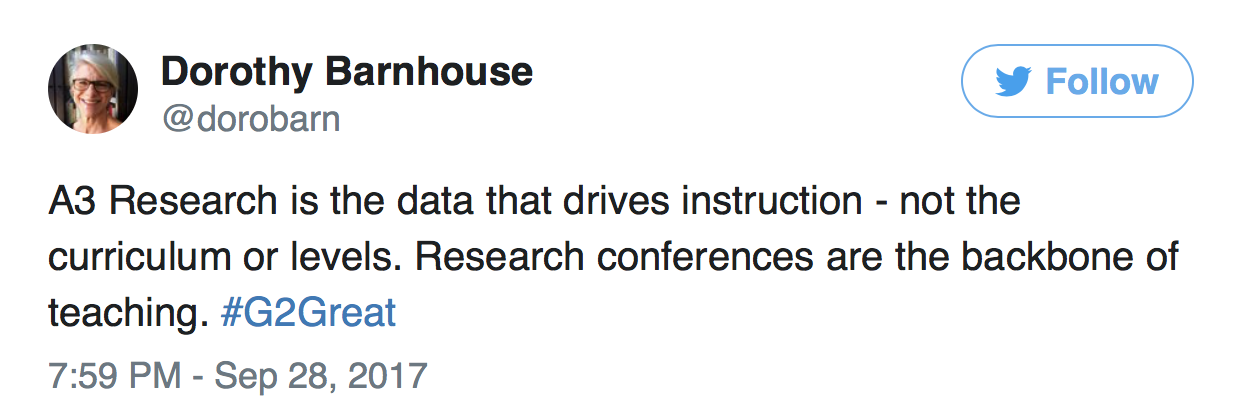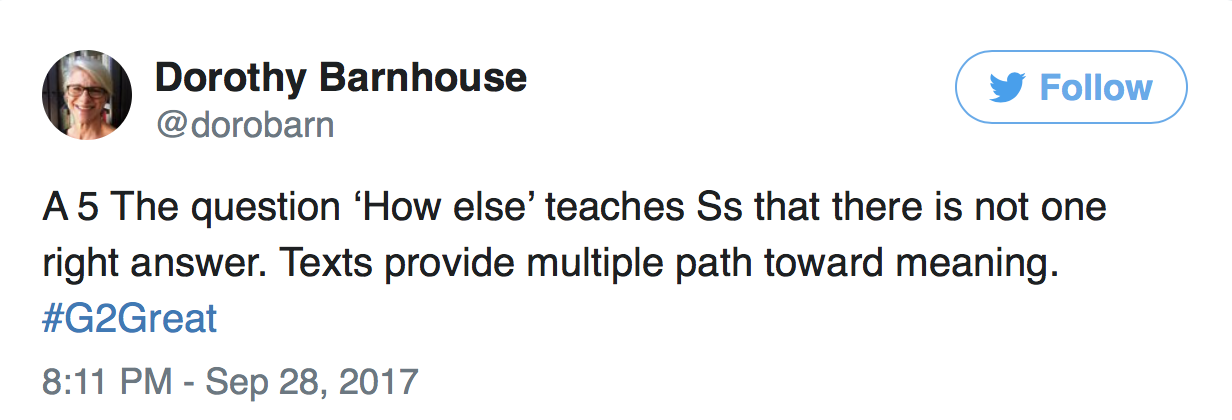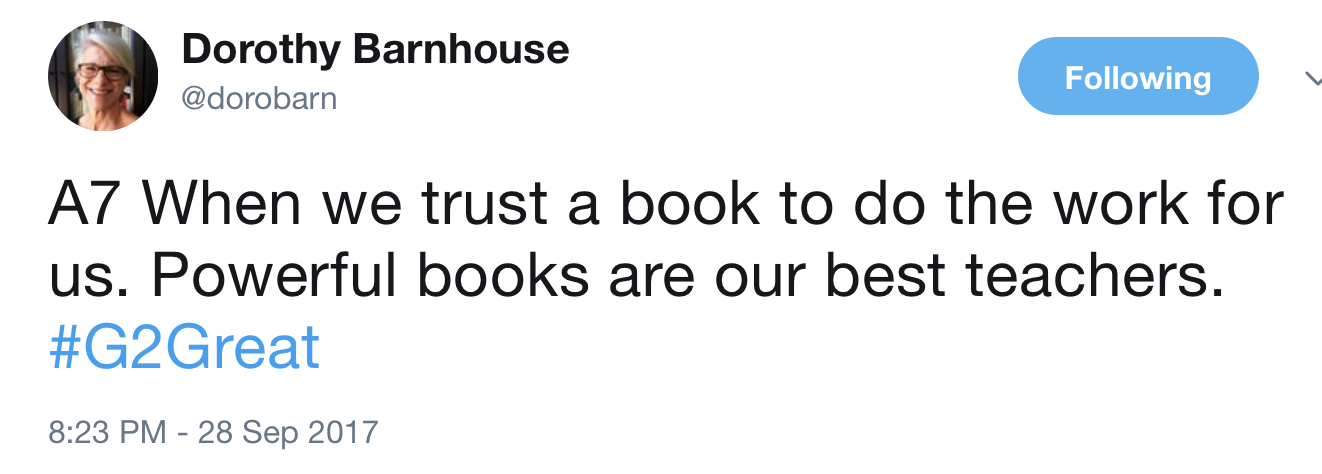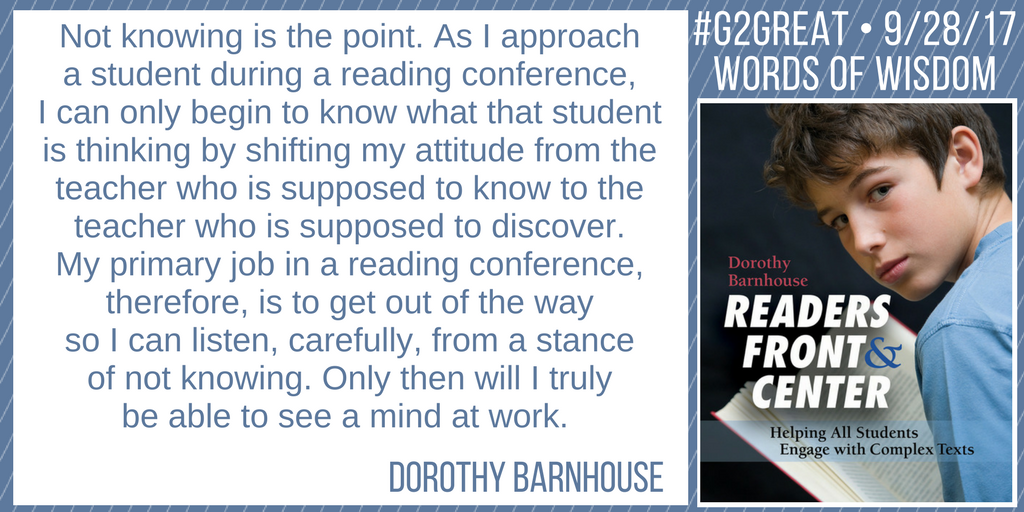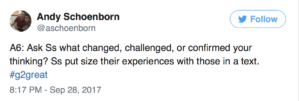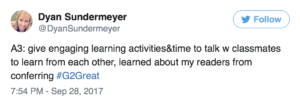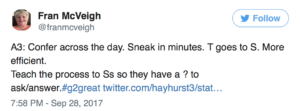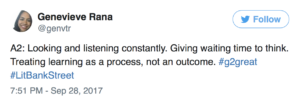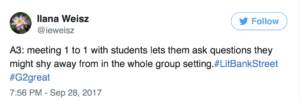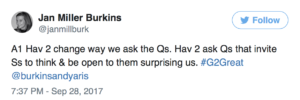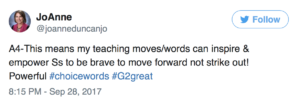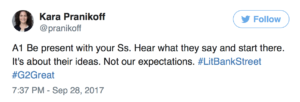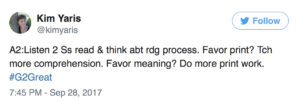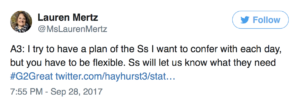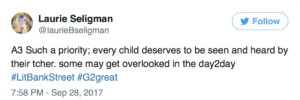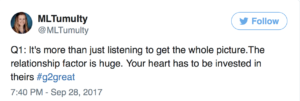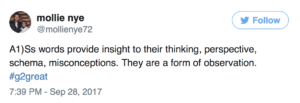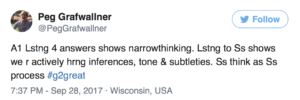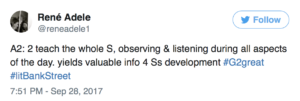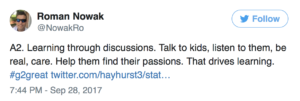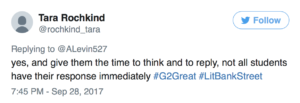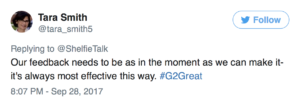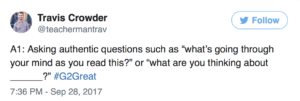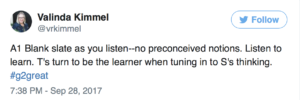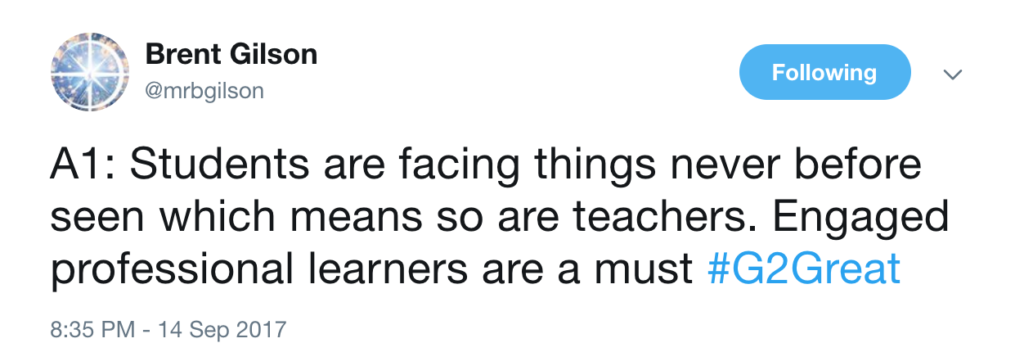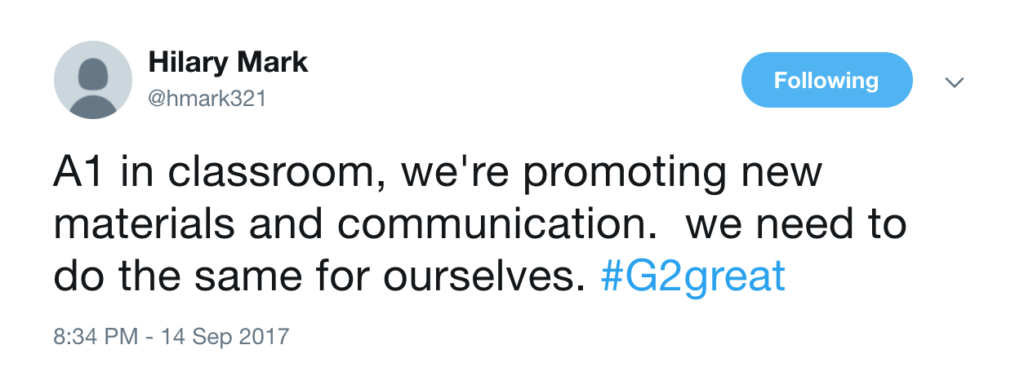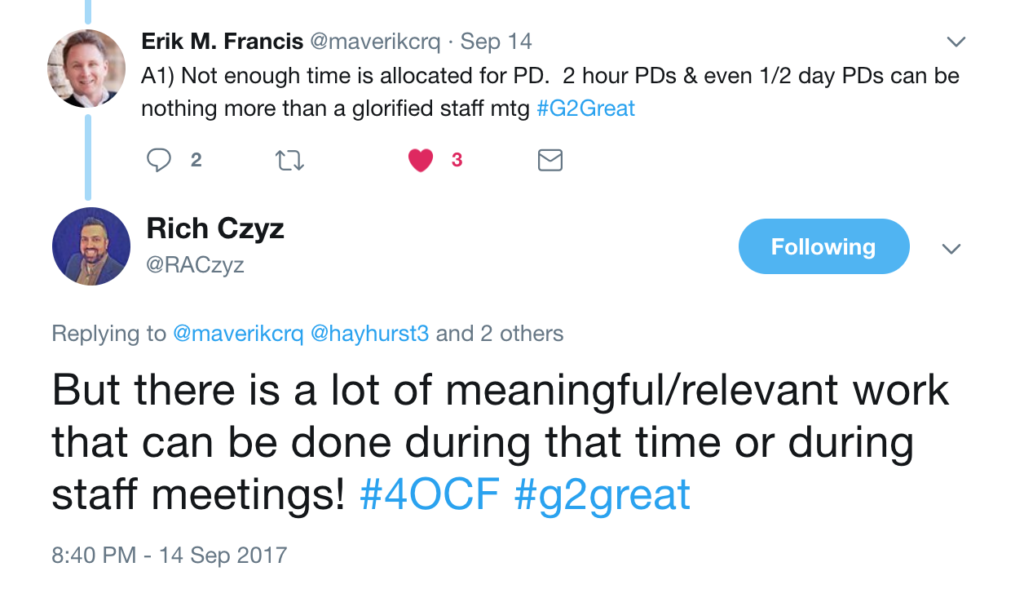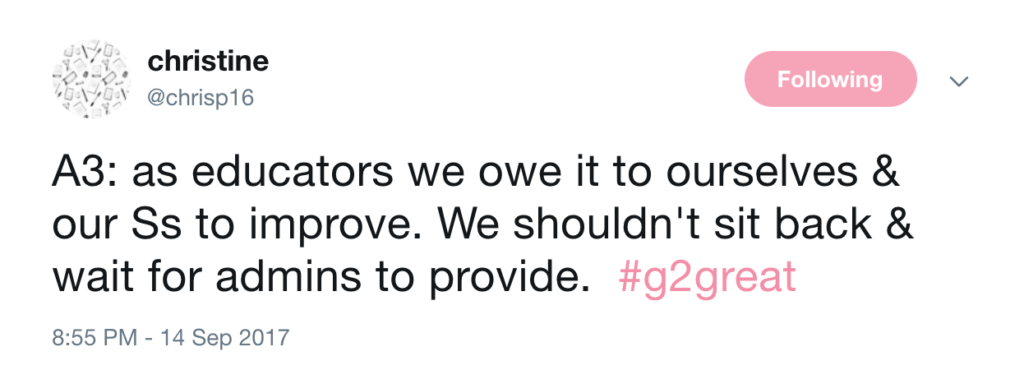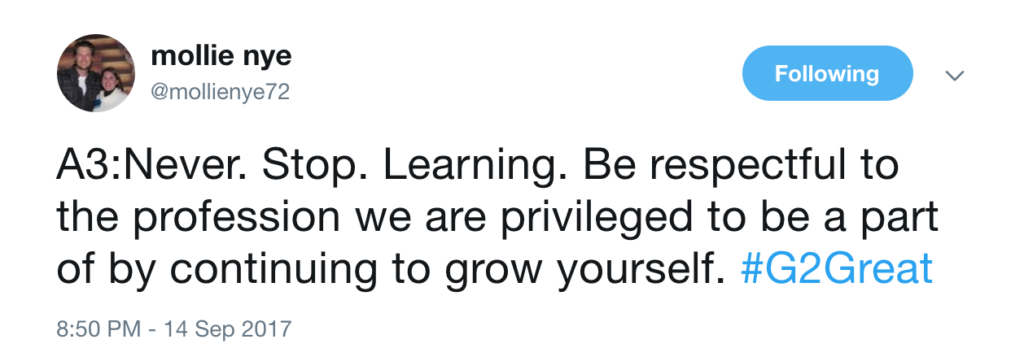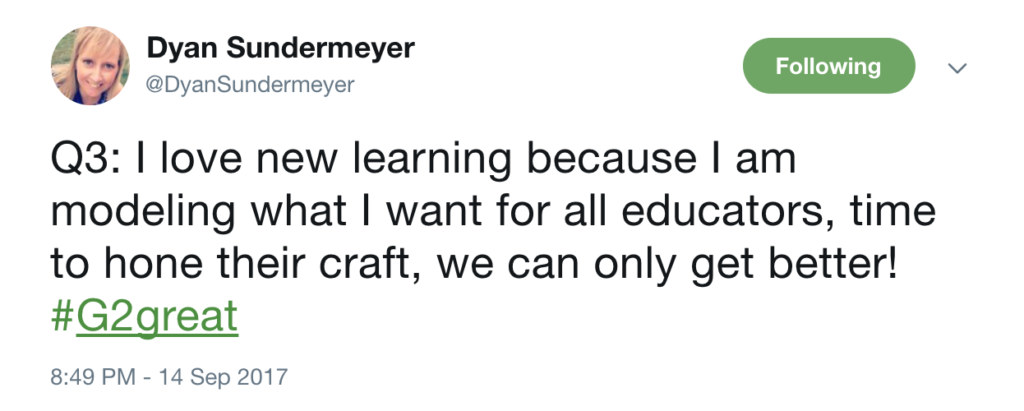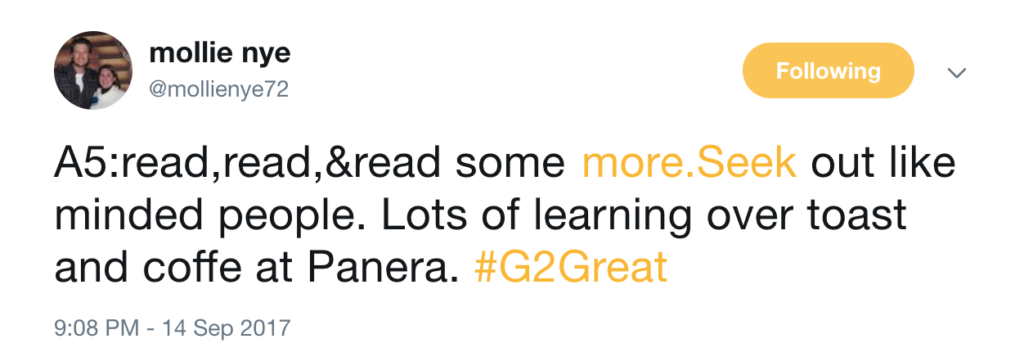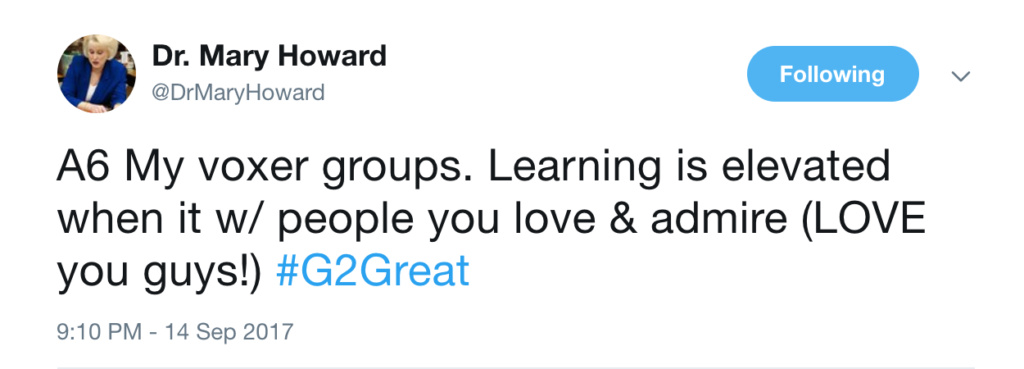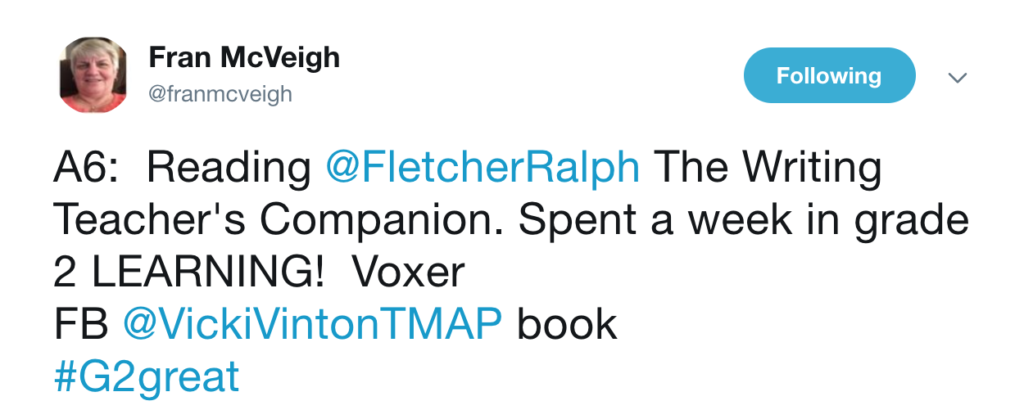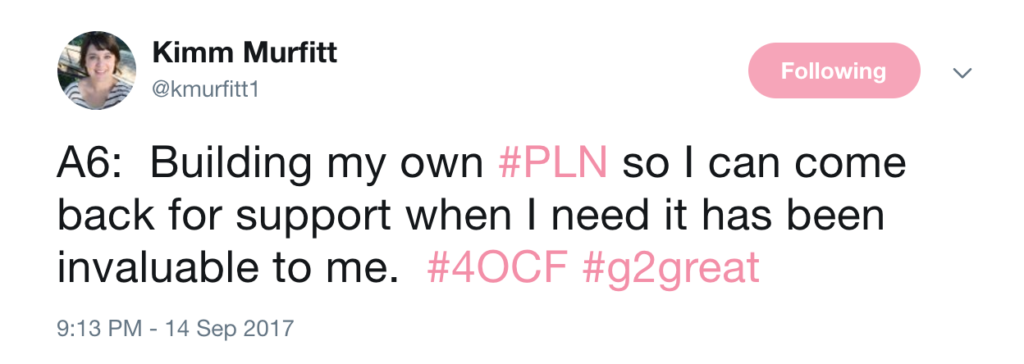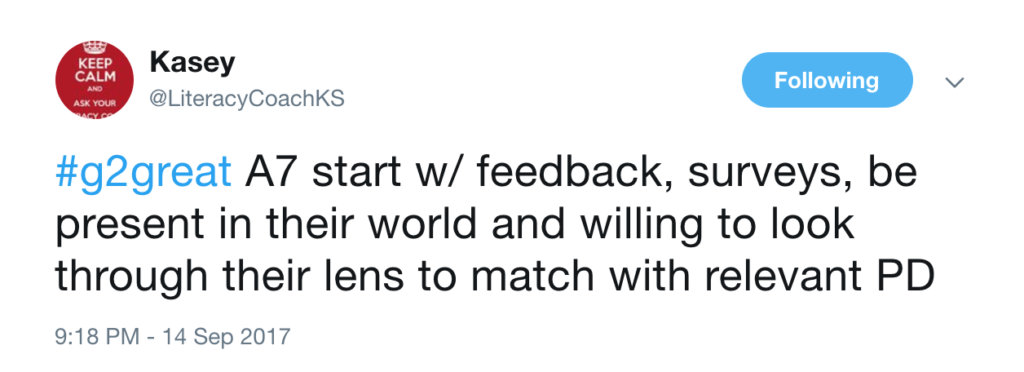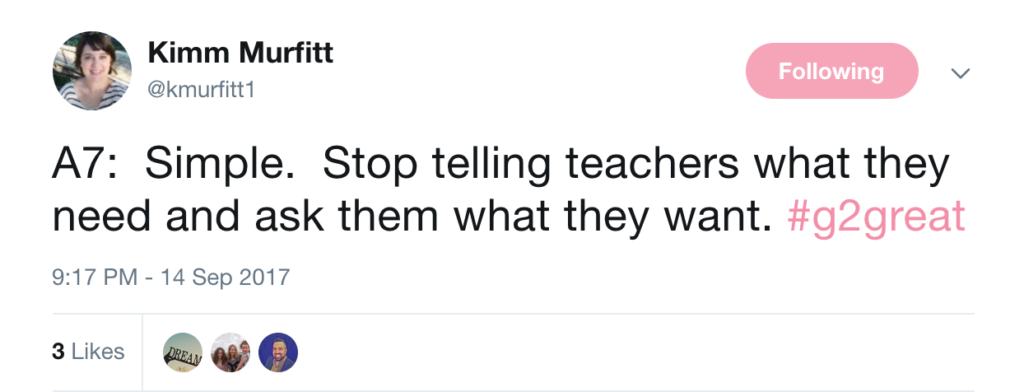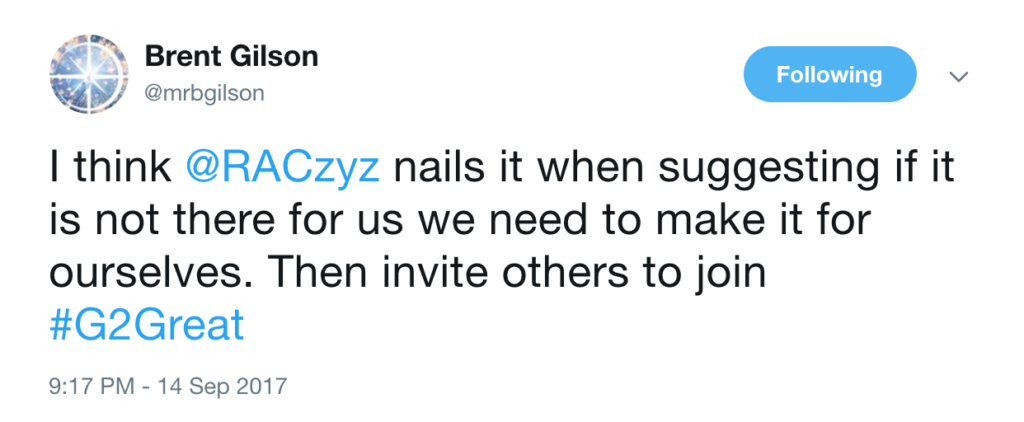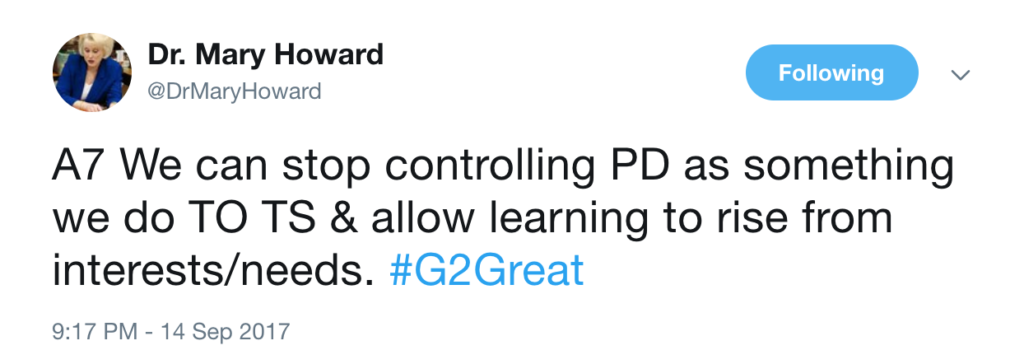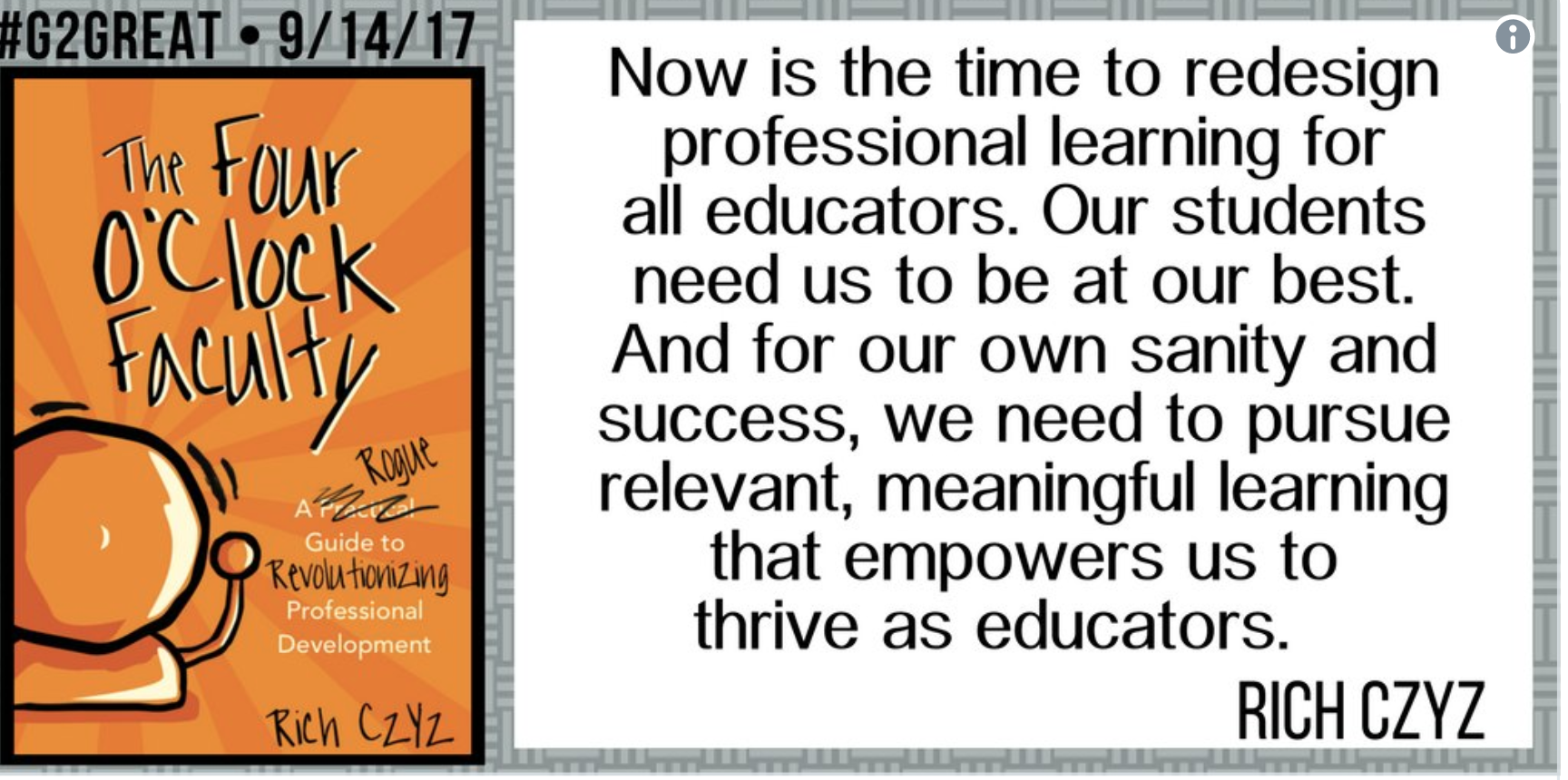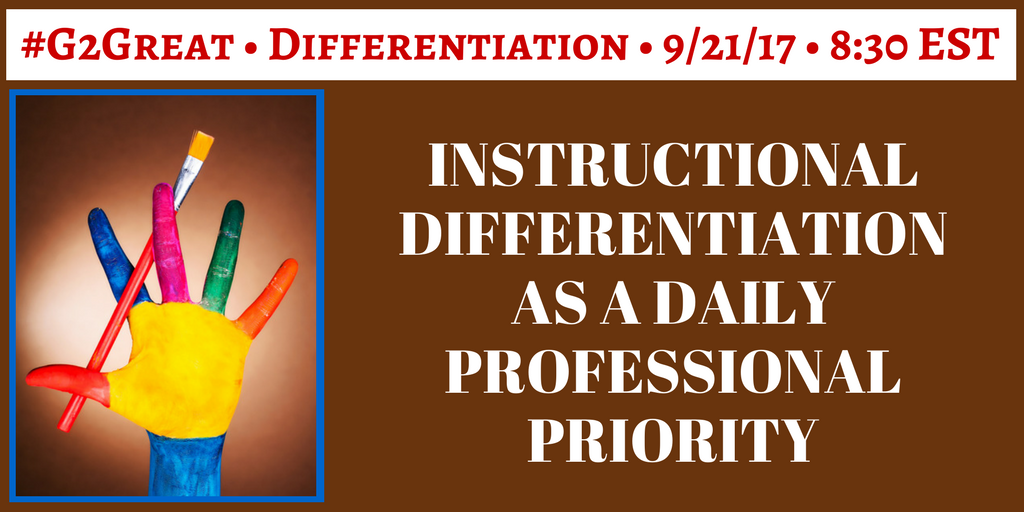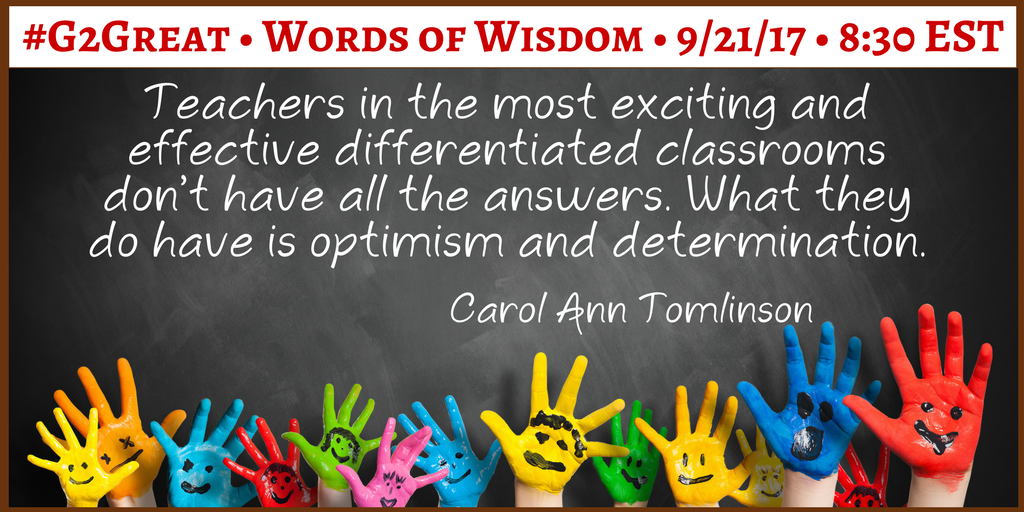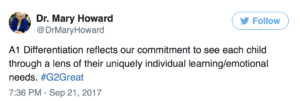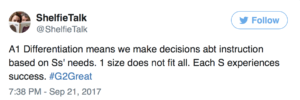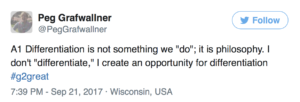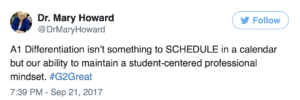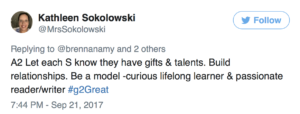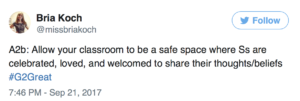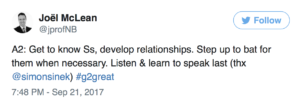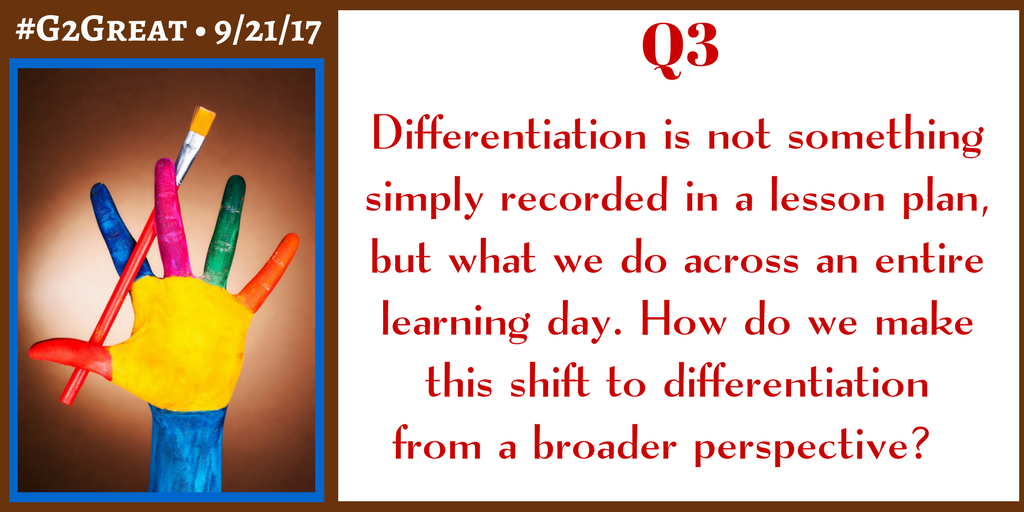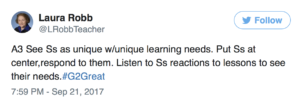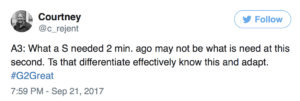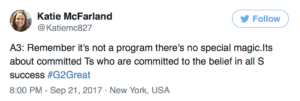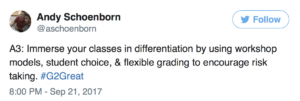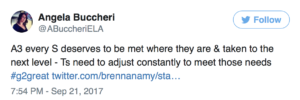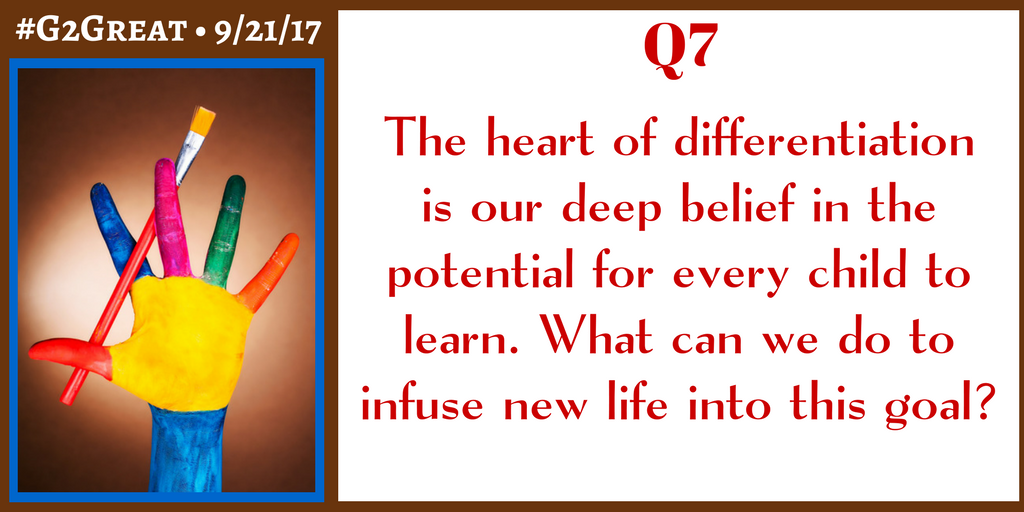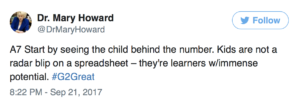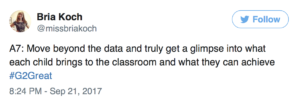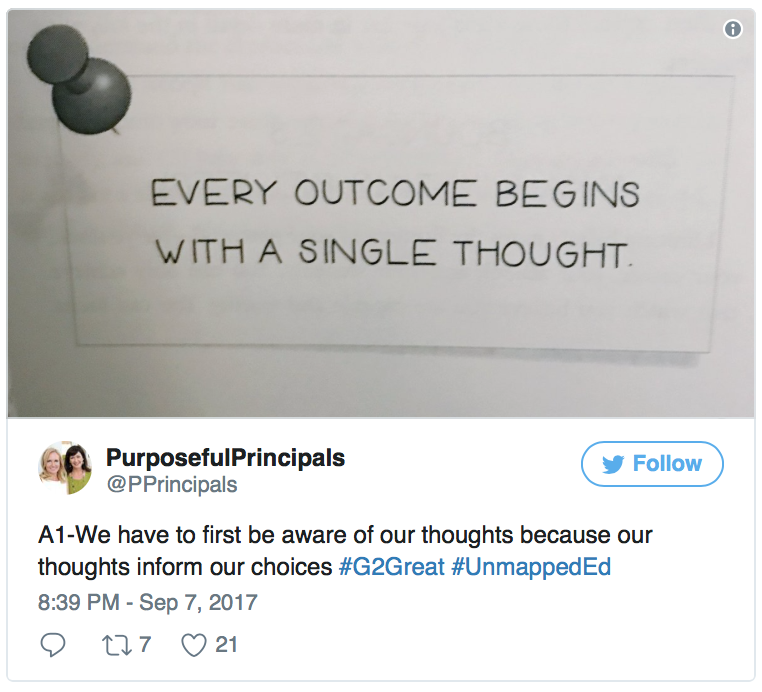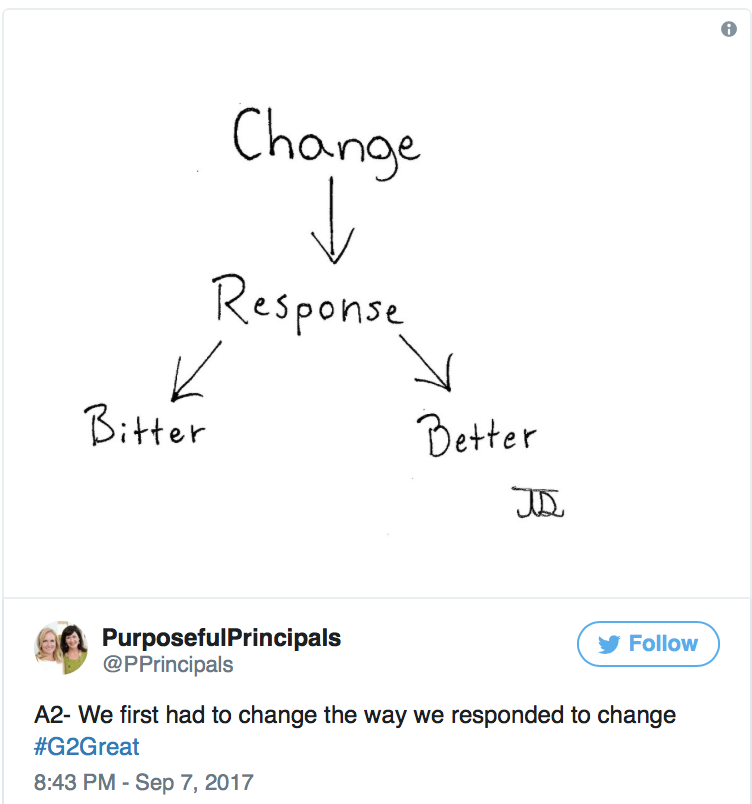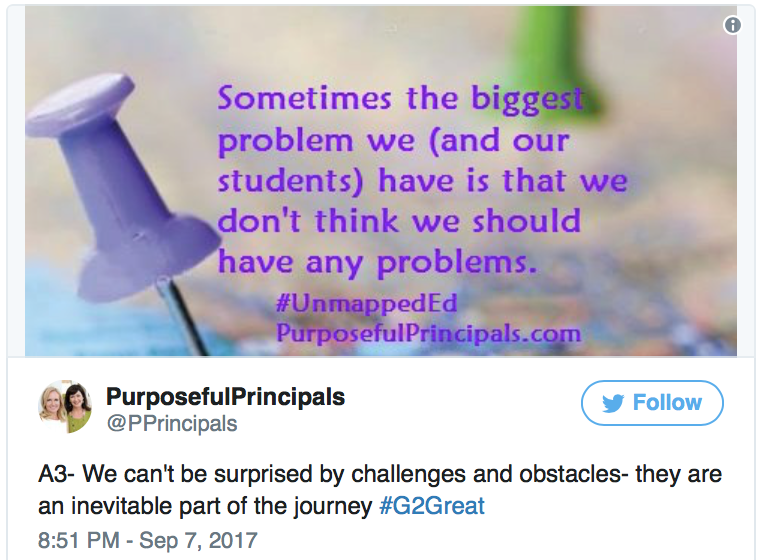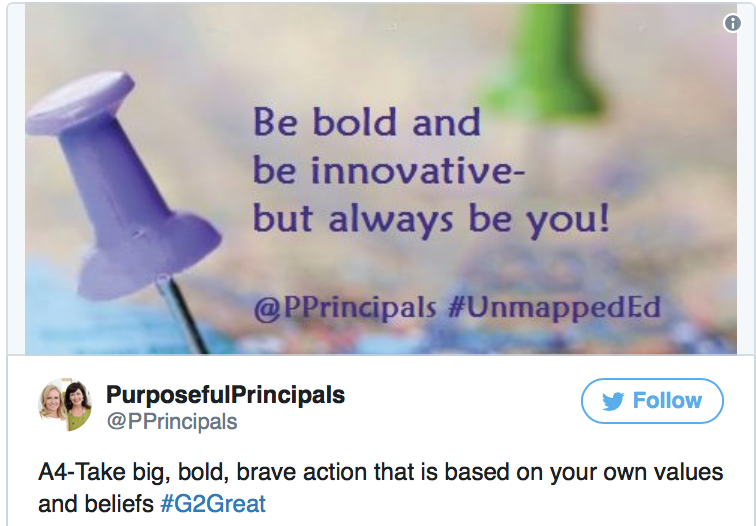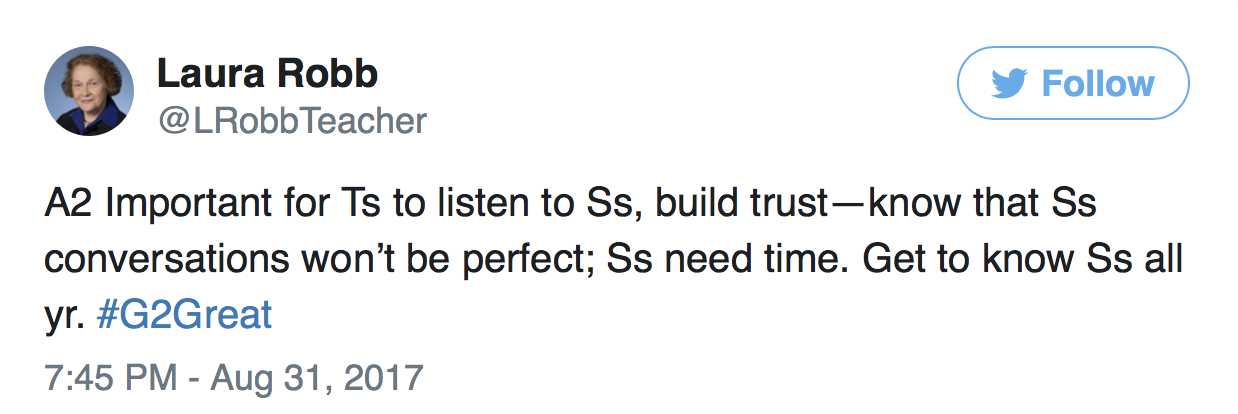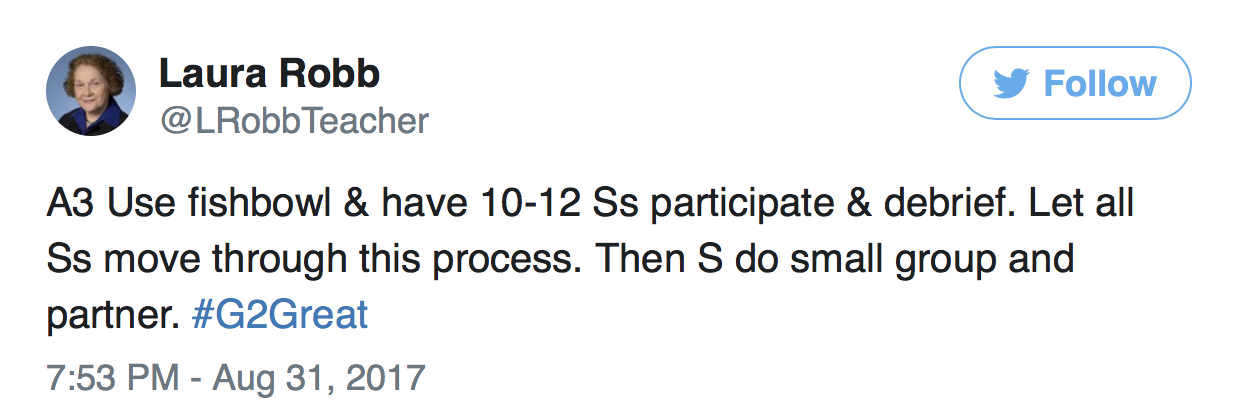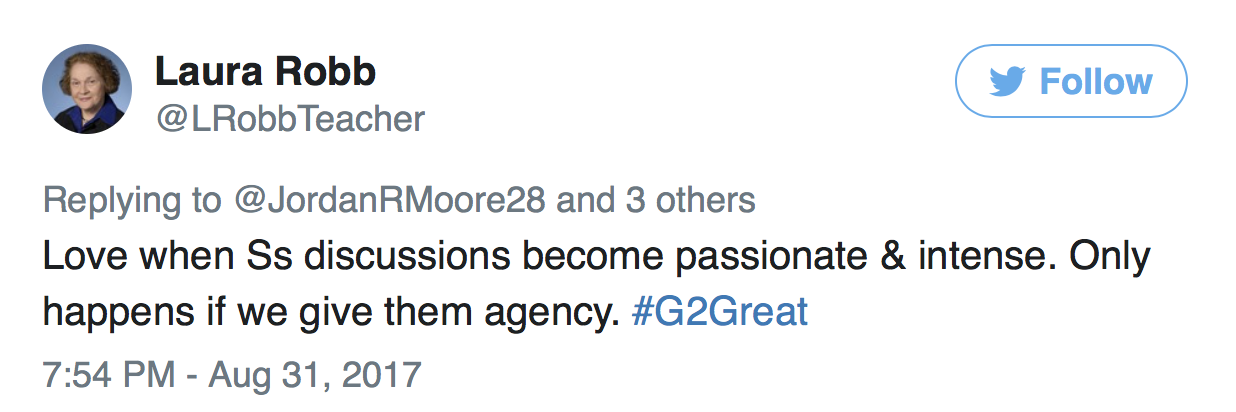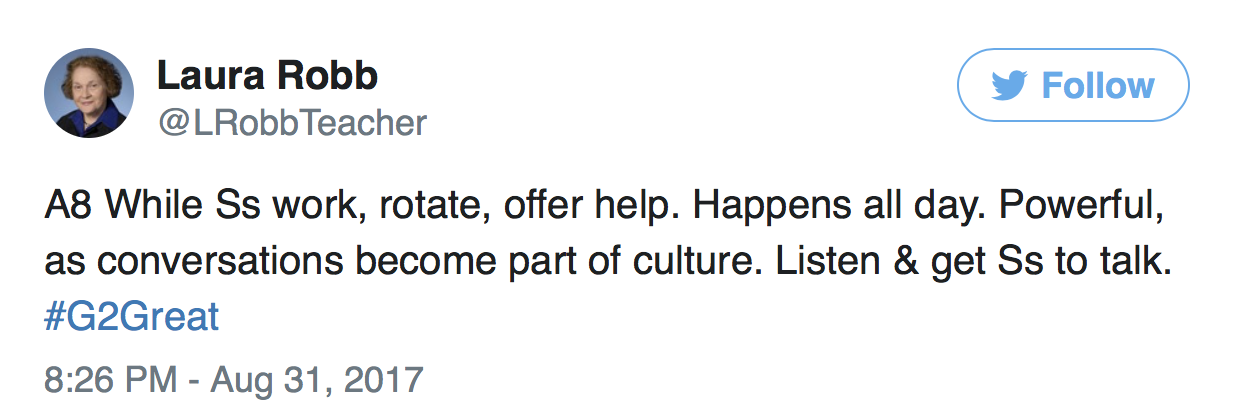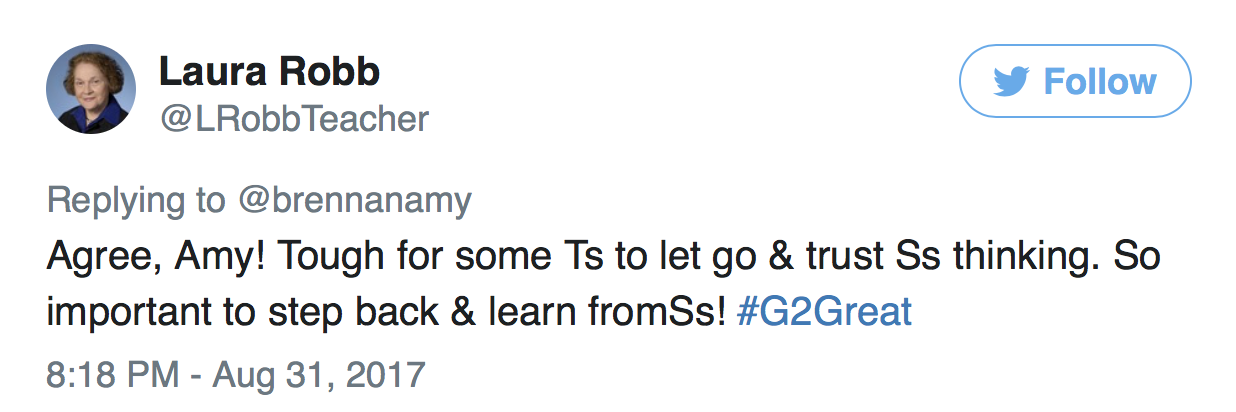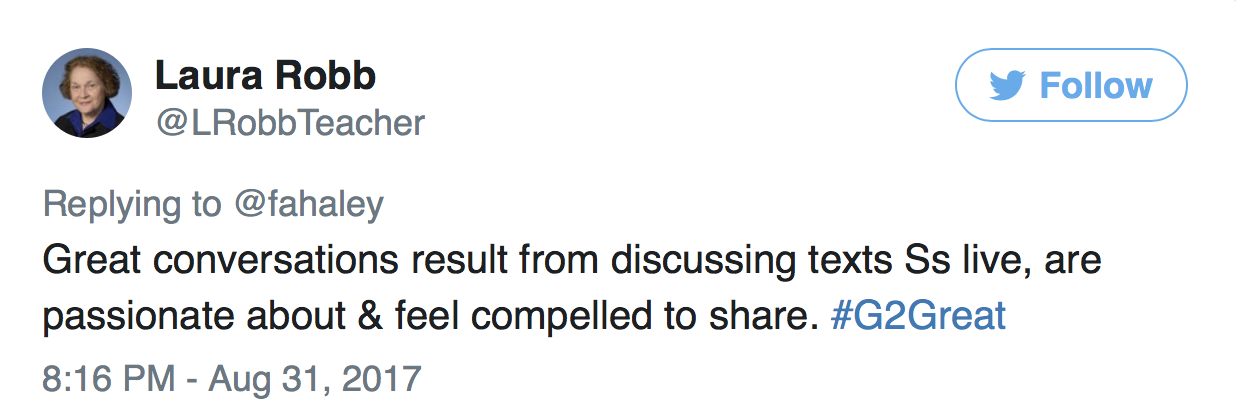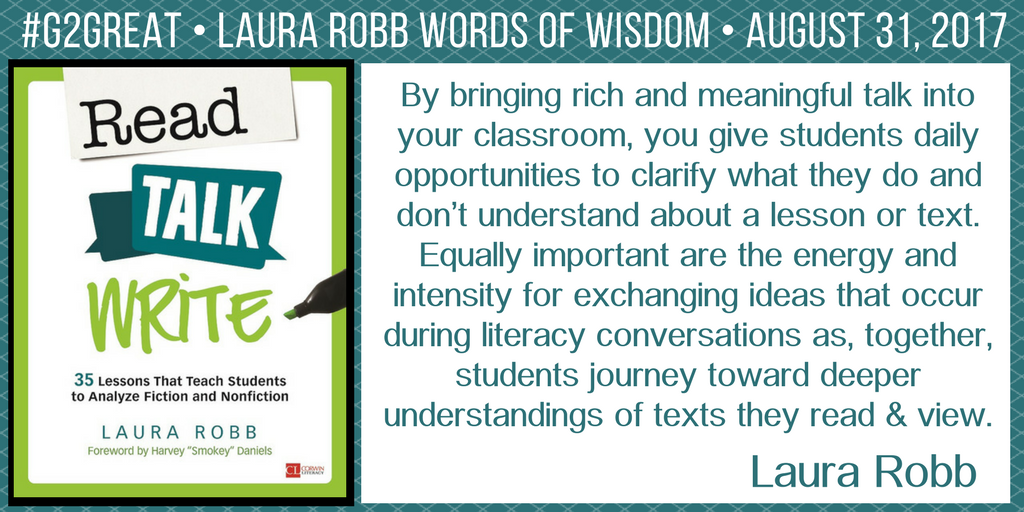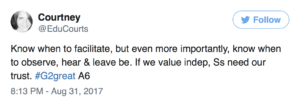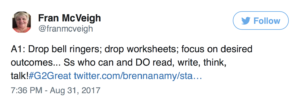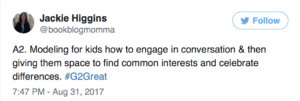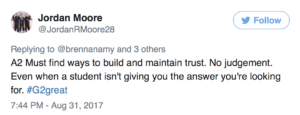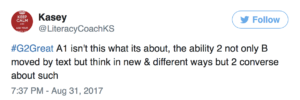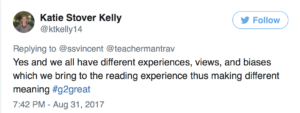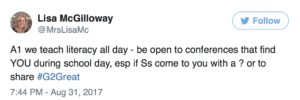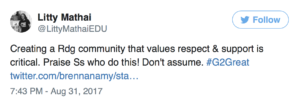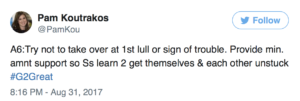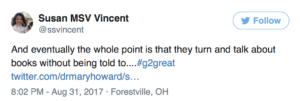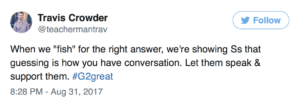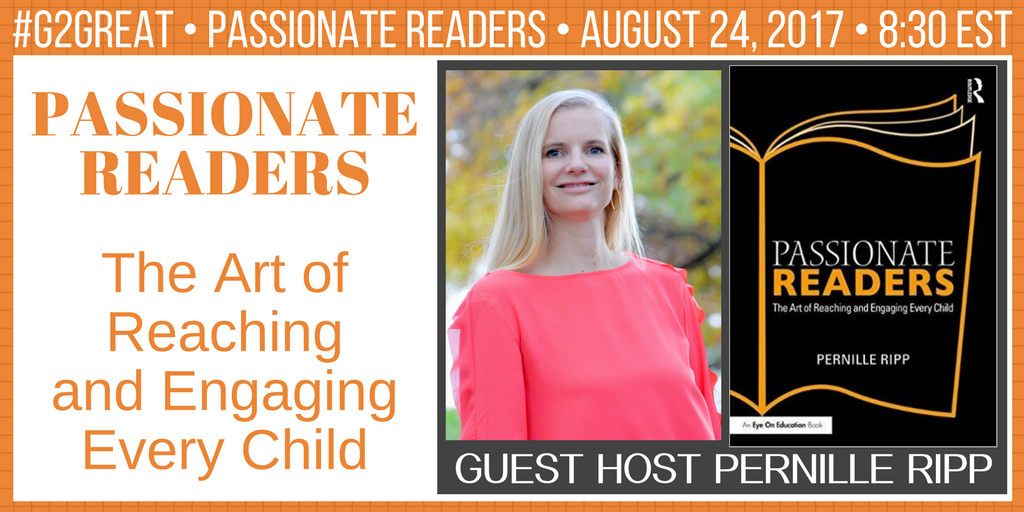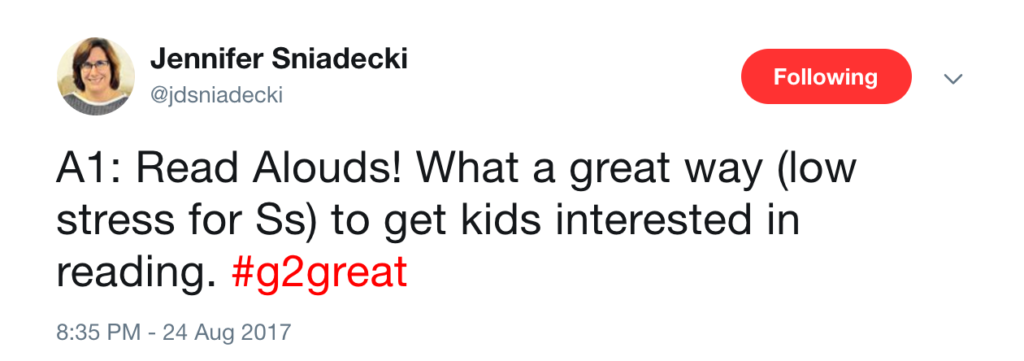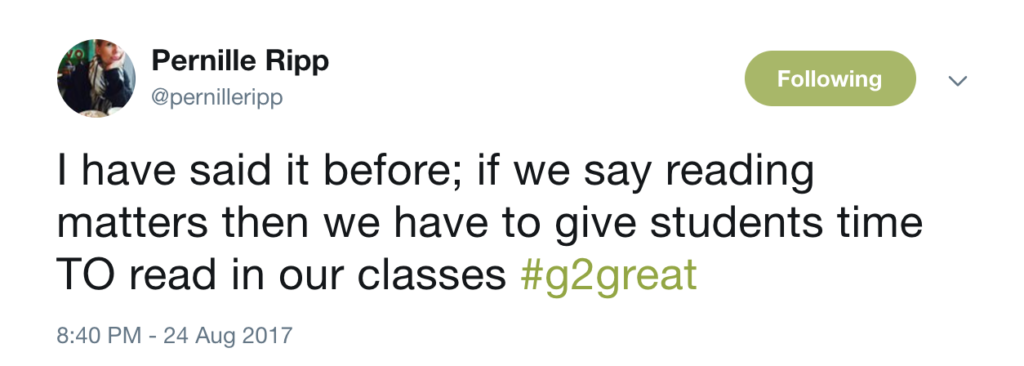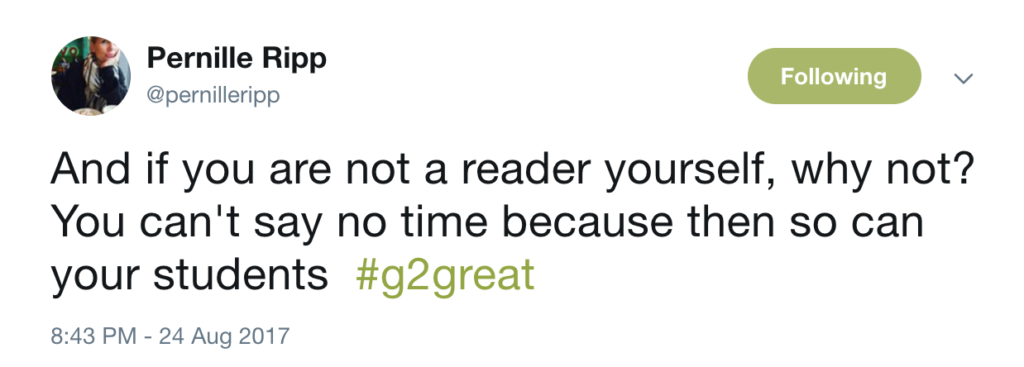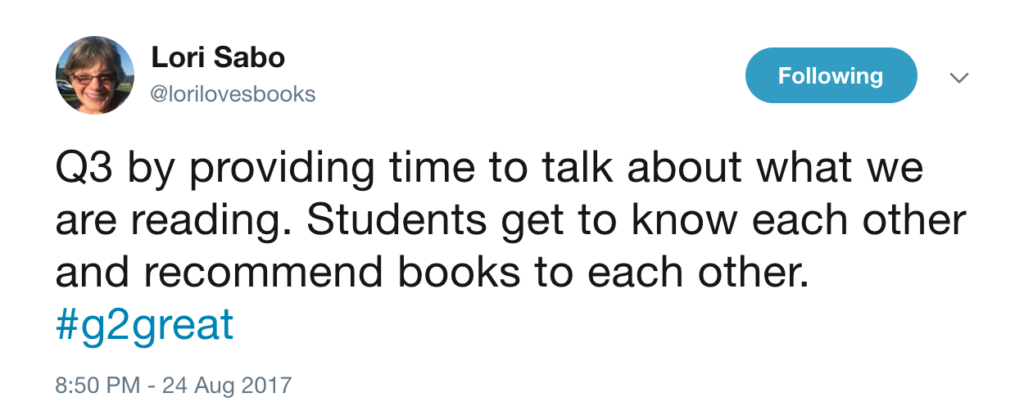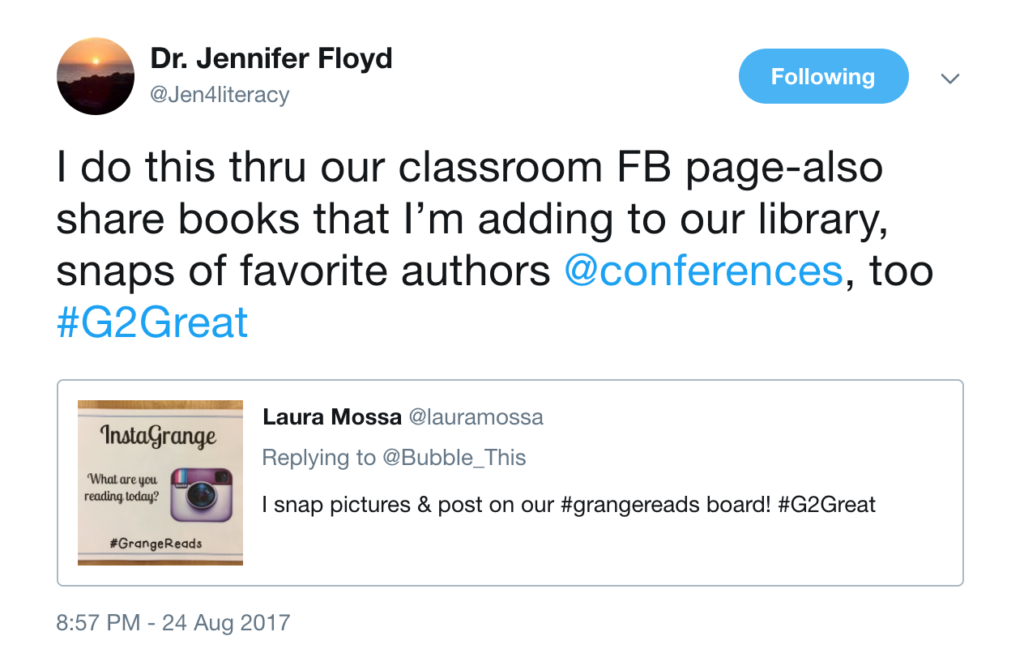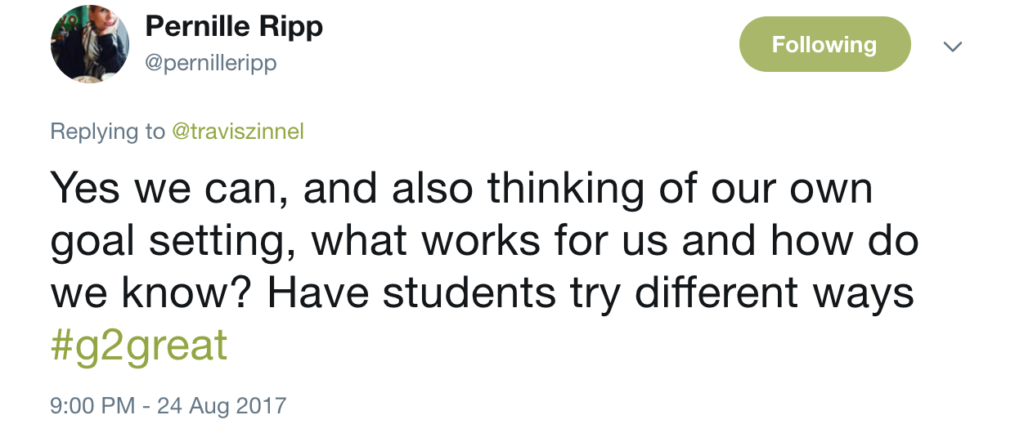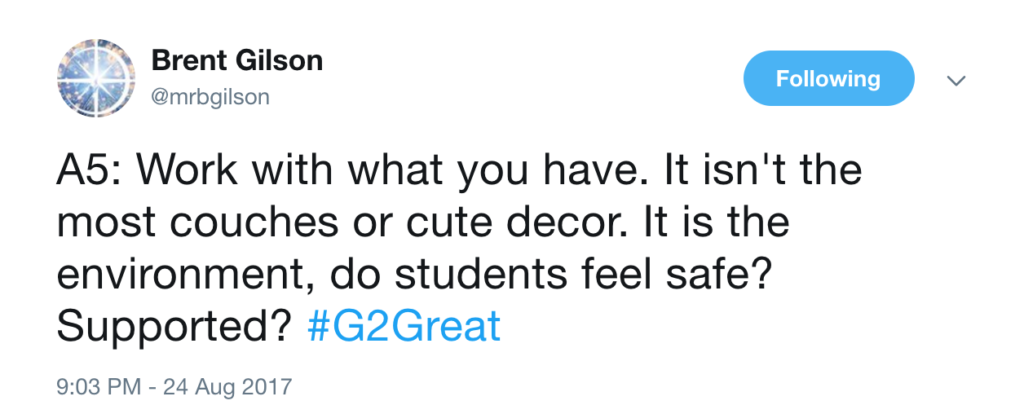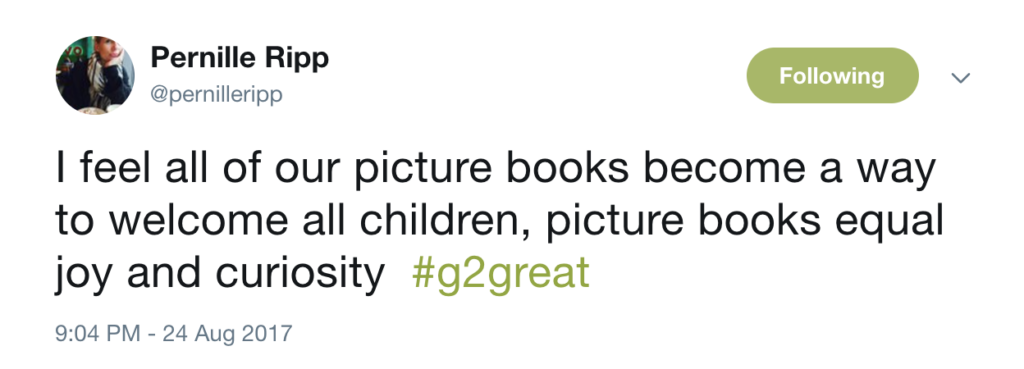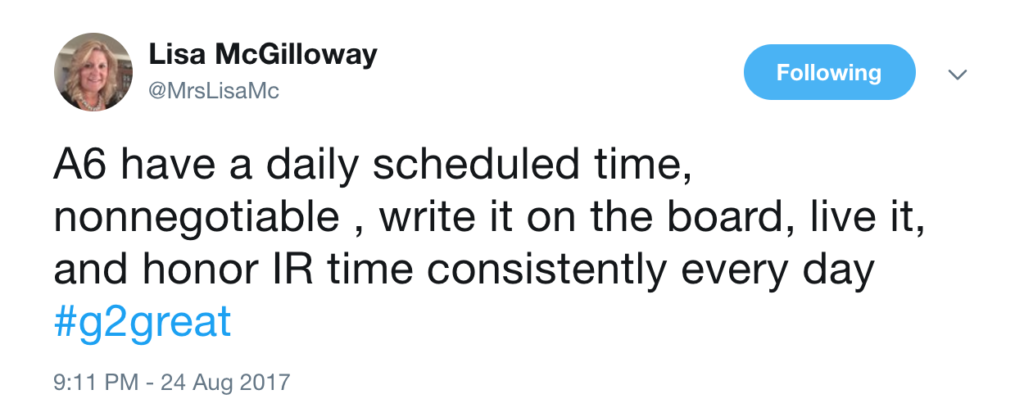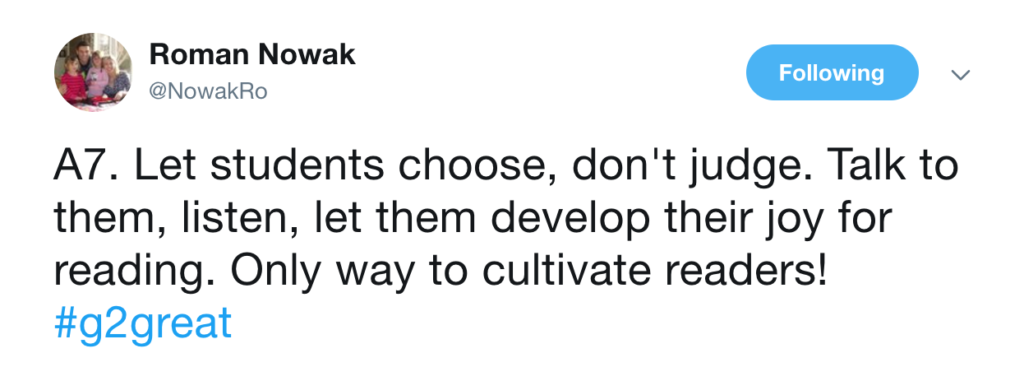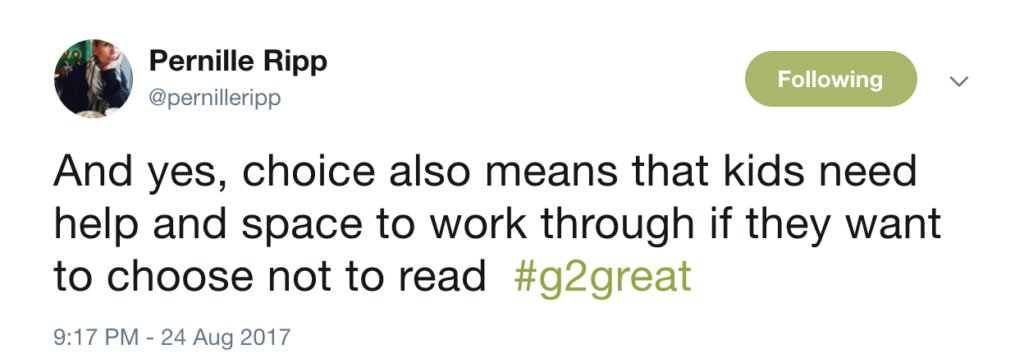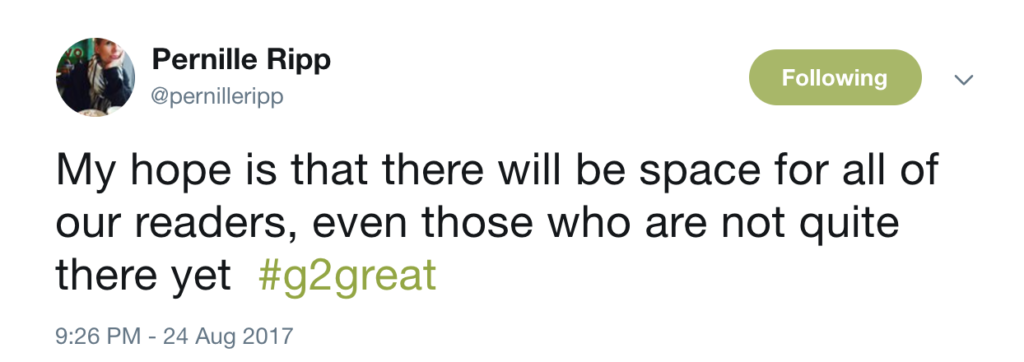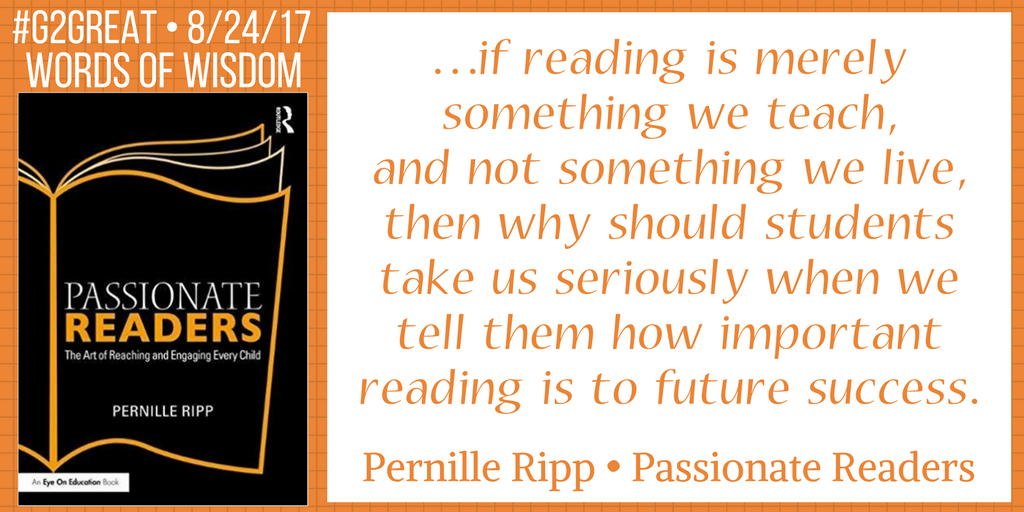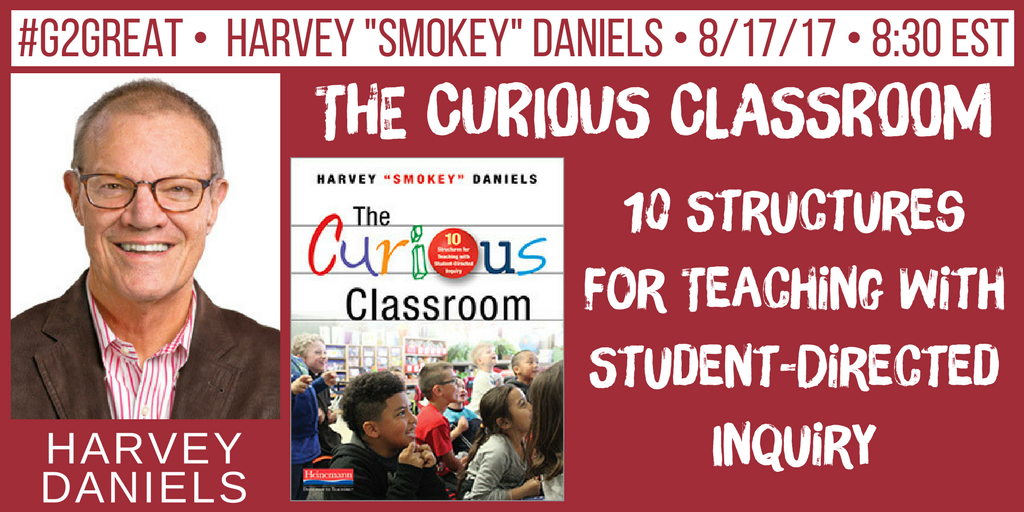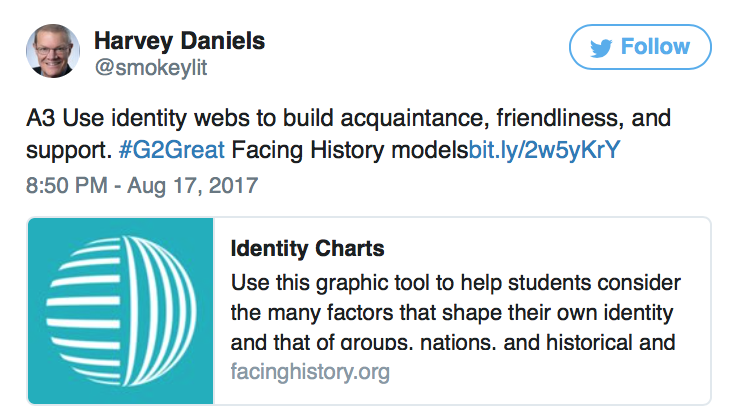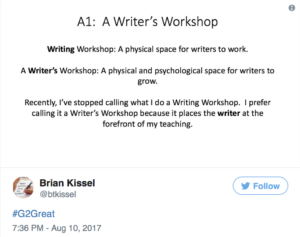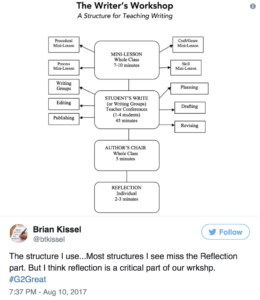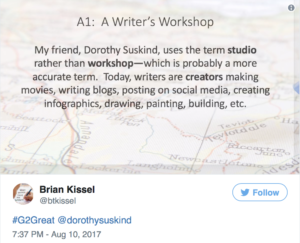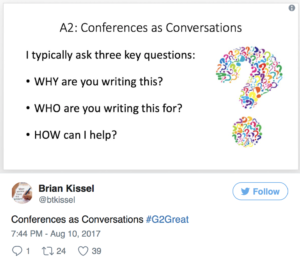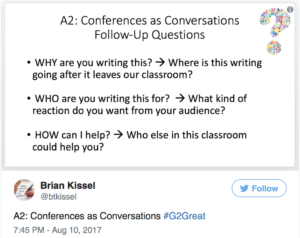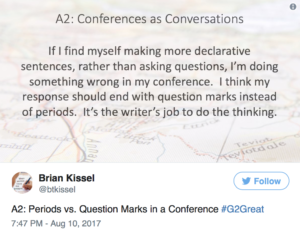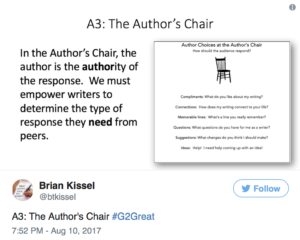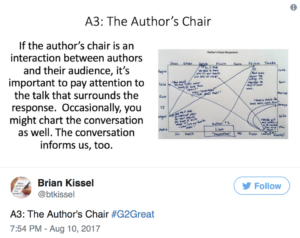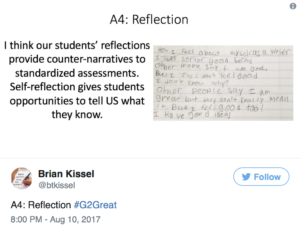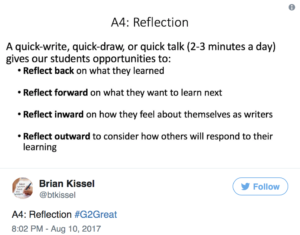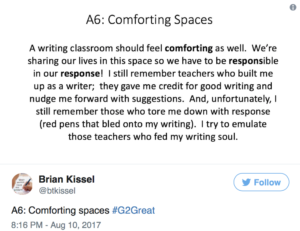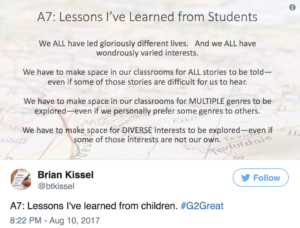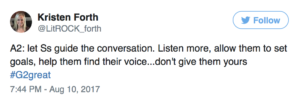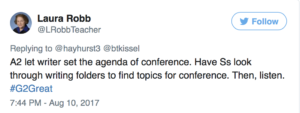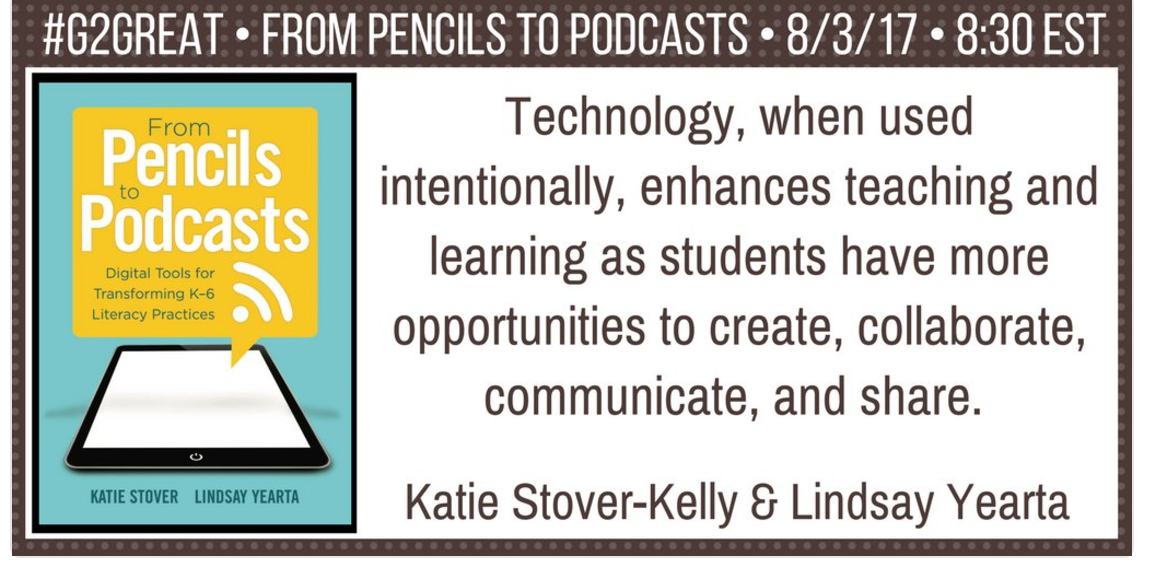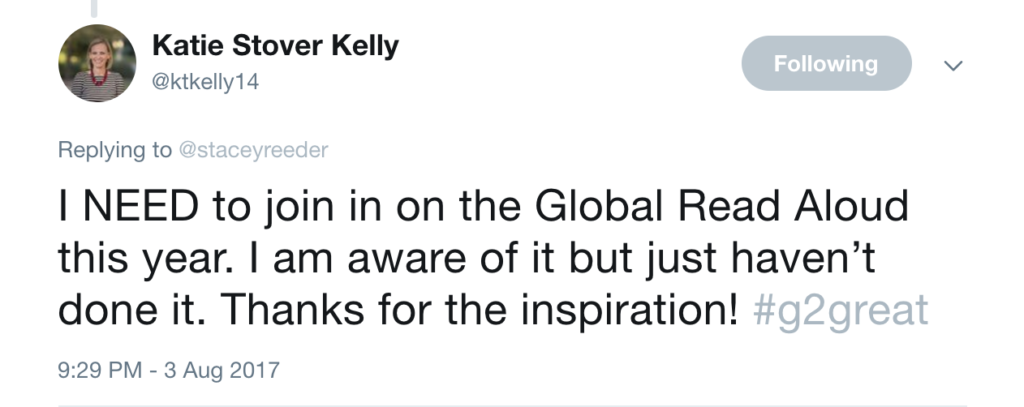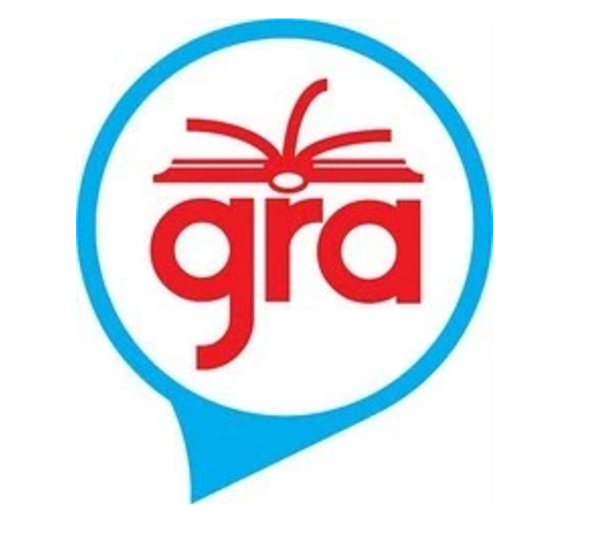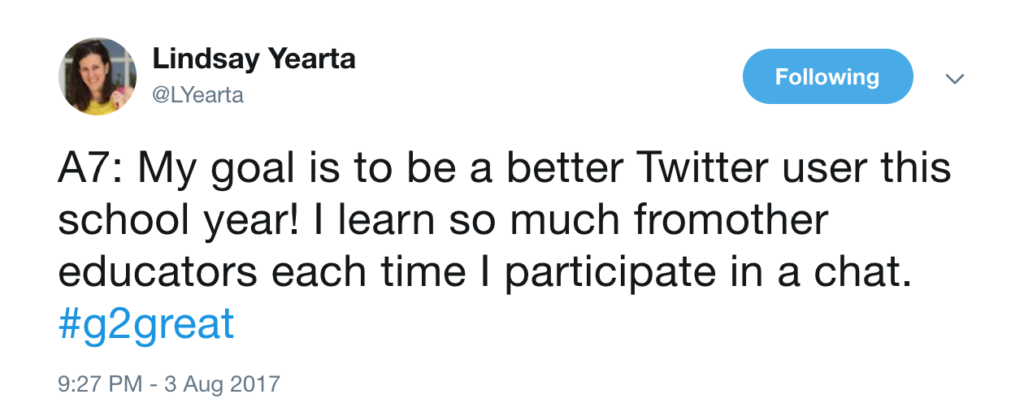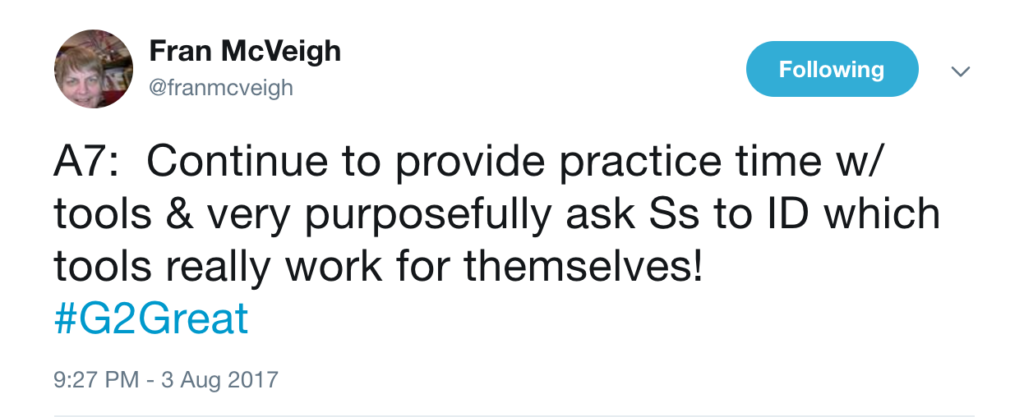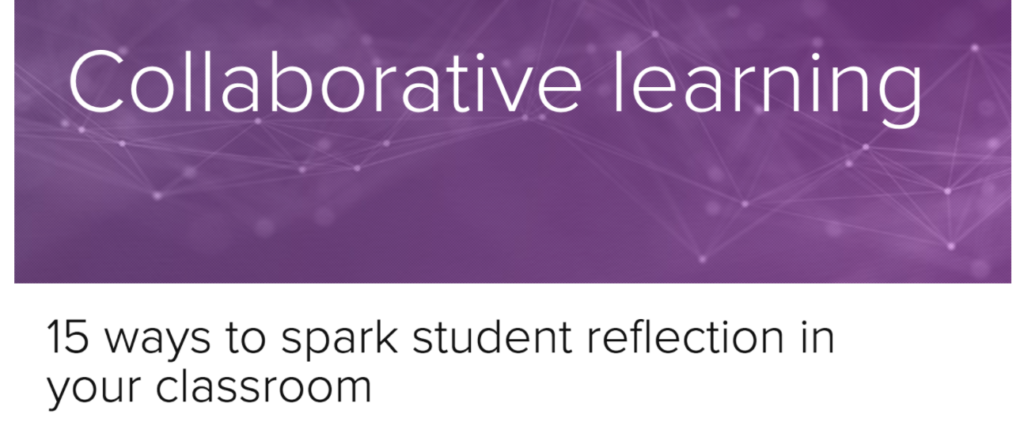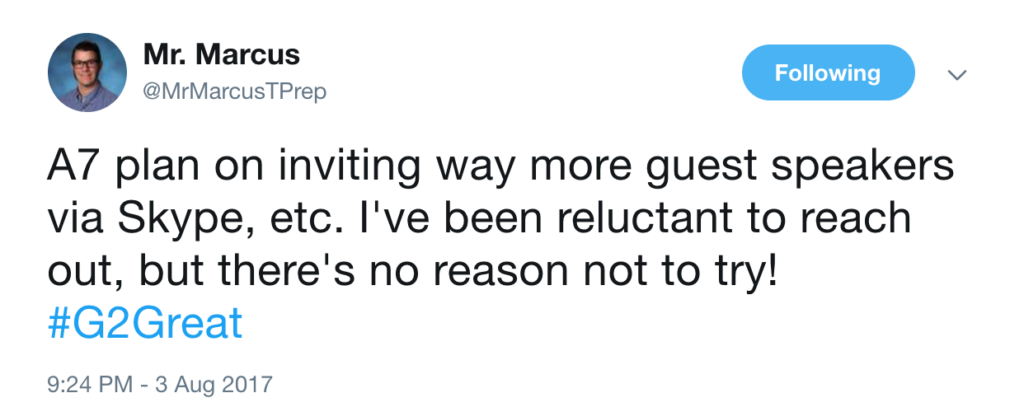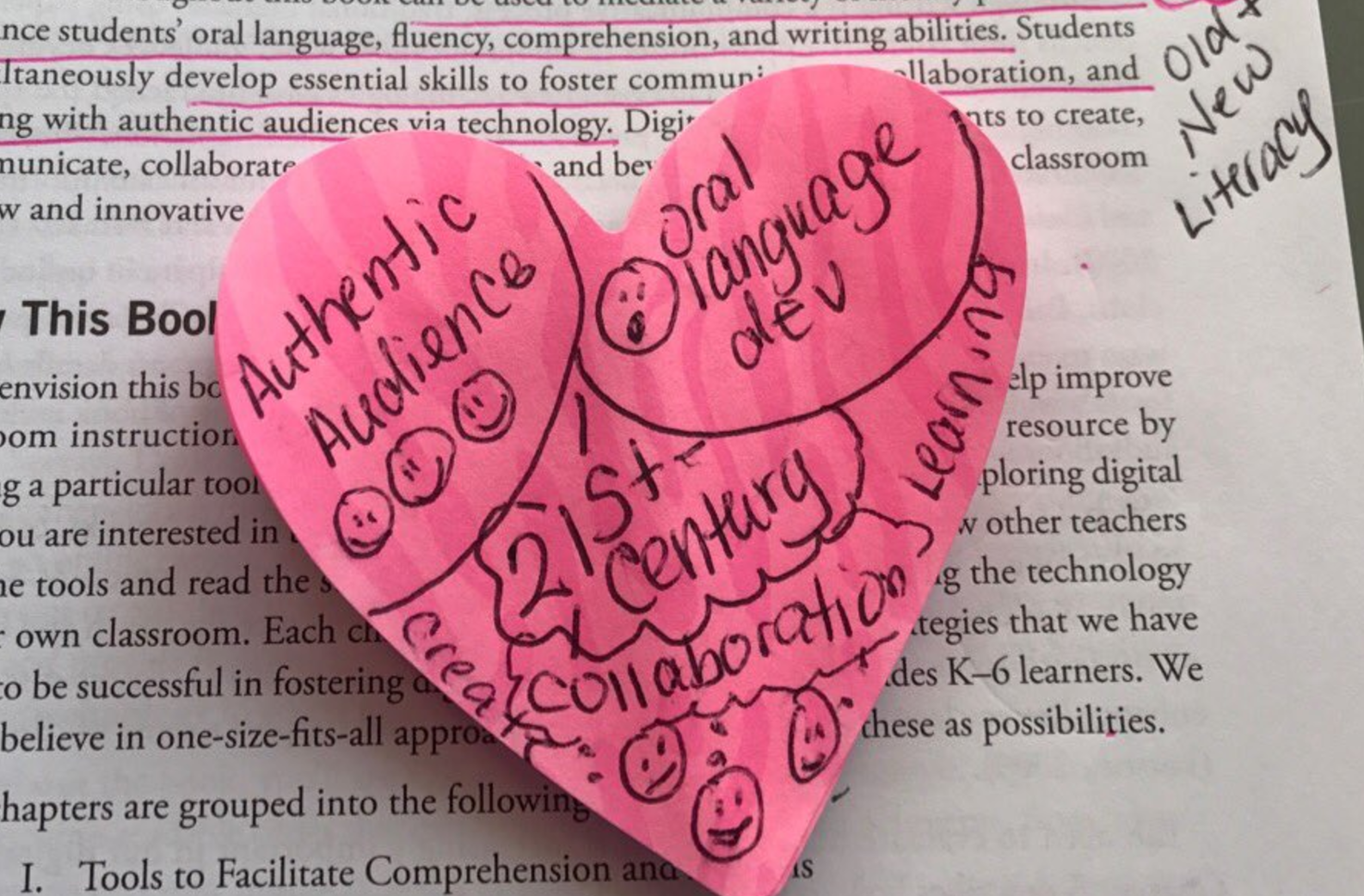by Mary Howard

I was thrilled when Brian Kissel took our #G2Great seat of honor on 8/10/17 as we settled in to engage in a Twitter style celebration of his incredible new book, When Writers Drive the Workshop: Honoring Young Voices and Bold Choices (Stenhouse, 2017). Judging from the response, I’m obviously not the only educator inspired by his celebration of writers between two covers.
My growing friendship with Brian was an unexpected gift that began when I was perusing new books at Stenhouse and happened upon his book by a stroke of pure luck. The title literally reached out from the screen and grabbed me by the heartstrings so I excitedly opened the preview and began reading the first page of his introduction:
“Today I’m worried. I’m worried because I know too many classrooms where mini-lessons begin with “seed” stories that germinate from laminated watermelons, predetermined conferences that always start with a compliment and end with a next step, and, if it’s included at all, an author’s chair or sharing time entirely driven by the teacher to reinforce a point he or she made during the mini-lesson. Rarely do children reflect on their own writing. And if they do, it’s often to fulfill a teaching agenda rather than a learner’s agenda. When did packaged programs and Pinterest replace children as the driving force of instruction? When did everything start to look the same? (Brian Kissel, page 5)
Brian’s powerful words and two questions made it clear that I had just found a kindred spirit. In typical enthusiastic Mary style, I immediately sent an email with a #G2Great invitation at the forefront of my mind. And so began our first exchange illustrating our shared concern:
Mary: I just found out about your new book, When Writers Drive the Workshop and I must say I’m very excited by your message. I’ve become increasingly frustrated that the heart and soul of writer’s workshop has been confiscated and steadily replaced in far too many schools with instructional boxes that are turning teachers into compliant disseminators. Your book was a breath of fresh air.
Brian: For the past several years I’ve been bothered by the workshop being overtaken by these packaged programs, scripted lessons, Pinterest, etc. Our writers should be the curriculum! So, I really wanted to write a book that puts the focus back on writers and gives teachers permission to trust that their writers can lead the way. I hope that message comes across in the book.
Oh yes, my wonderful new friend… that message came across loud and clear! Early in our #G2Great chat with Brian, our first conversation resurfaced in a Twitter exchange: 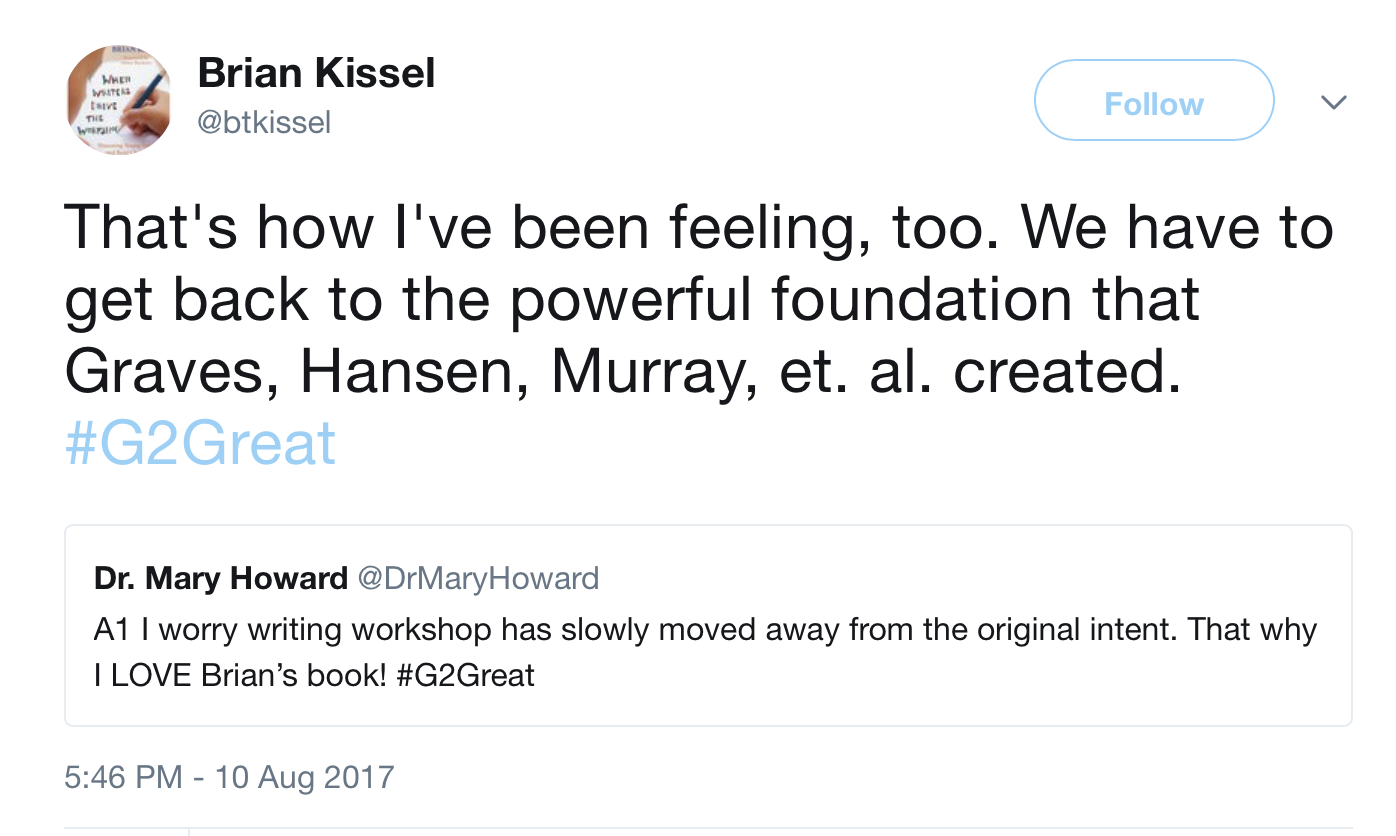
Brian’s words should strengthen our resolve to reclaim writer’s workshop in honor of our writers. As I write celebratory words of an unexpected friendship, I reflect on our #G2Great chat and find six Brian-inspired Driving Lessons to gently nudge us to return writers to a rightful place of honor in a writer’s workshop model envisioned by great minds so many years ago:
Driving Lesson 1: Keep the Writer in Your View
If we hope to reclaim a writer’s workshop in the spirit of these great minds, we must begin by relinquishing a death grip on lessons created by those who do not know our writers. A quick google search of the words “writer’s workshop” puts an unlimited array of resources at your fingertips. But do we ever pause to consider if this plethora of questionable grab and go ideas and tools are worthy of our writers? Lesson scripts are plentiful in this day and age, but Donald Grave’s vision that we must teach the writer should highlight our obligation to reach higher by being responsive to the writer in front of us.
Driving Lesson 2: Be Present in Writer Moments
Brian reminds us that one of the most important ways to be responsive to the writer in front of us is to truly listen to the thinking we readily and willingly invite in the course of writing. We can only glean from the wisdom each writer brings to the writing table by paying close attention to little voices that rise joyfully above our own. When we are willing to step into precious learning moments that occur within the writer’s workshop experience, we acknowledge that our silence can make room for in-the-head writerly wisdom – wisdom that can lead us in unexpected directions we may never have considered before.
Driving Lesson 3: Respect Writer Perceptions
The first question we should be asking is, “Who is the writer in front of me?” The value of reflection, both from the writer’s and teacher’s perspective, was a recurring theme across the chat. Reflection allows us to see the writer from all sides using both a cognitive and emotional lens. How our children perceive of themselves as writers will play an essential role in the instructional process. In the course of listening we begin to understand the writer through their writing, their words and their actions during the writing workshop experience as well as across the entire learning day. The writing is the vehicle but the writer is our inspiration and instructional motivation that moves us into action. 
Driving Lesson 4: Embrace Writer Instincts
Why is it that goal setting is often viewed as something we do for the writer rather than using the writing experience as an opportunity to turn thinking inward. When we use their writing as a source of goal-setting inspiration, we can help children notice new possibilities as they emerge so that they can take ownership of this process. We support this thinking by acknowledging in the moment understandings that can move children from where they are to where they could be. When we actively engage writers in learning from the mindset of a writer in action, we can co-collaborate a journey of unique student-inspired step by step moves that will allow us to merge both their needs and interests.
Driving Lesson 5: Celebrate Writer Journeys
The word ‘choice’ came up repeatedly in each chat discussion. Brian reminded us that we not only need to ensure that choice is seen as an integral part of the writer’s workshop model in general but that we broaden our view of choice. When we explore choice from a broader scope, we can begin to consider how to offer our writers choice in not just what they write but also where, how, and with whom they write. Choice is a critical ingredient as it actively engages the writer in a writer-centered view of writing where joy ignite new thinking. But this will only occur if we welcome our writers to the decision making table.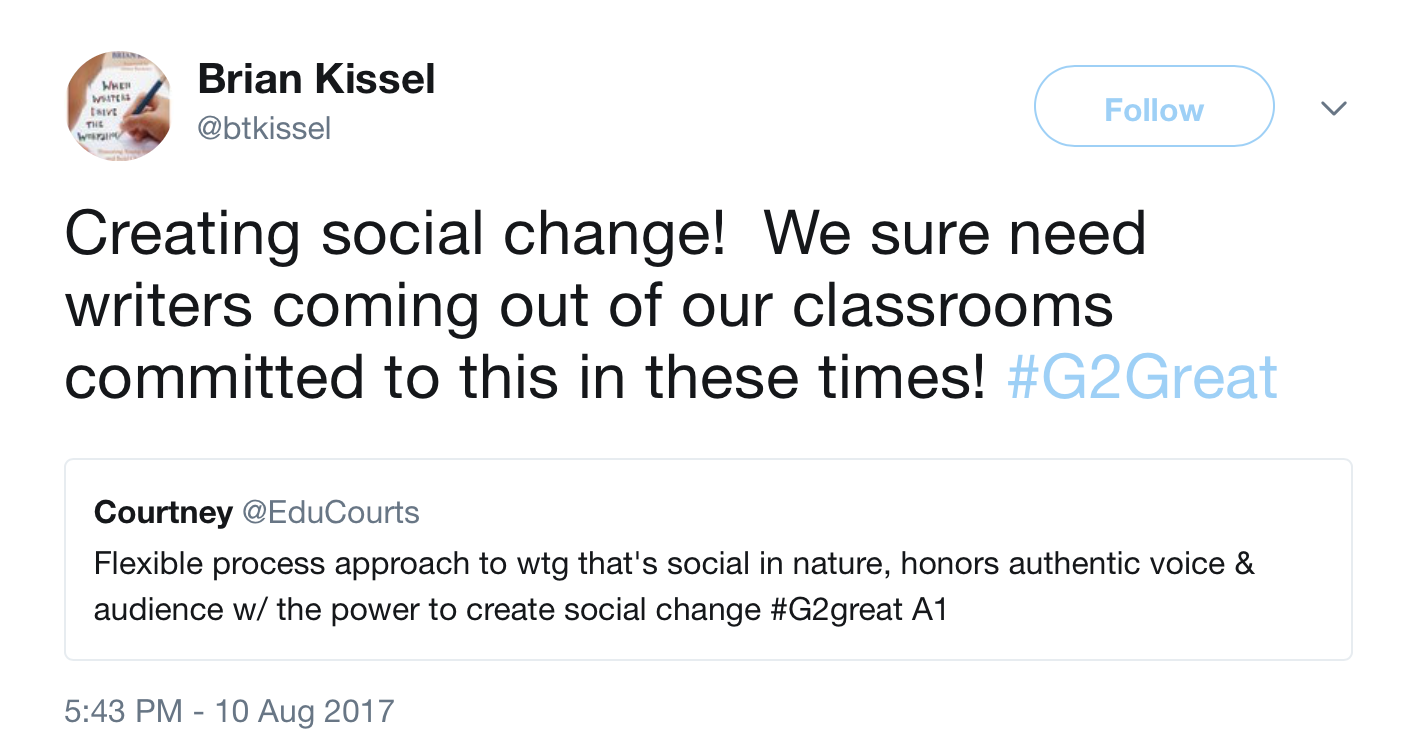
Driving Lesson 6: Release Writer Potential
Our final lesson begins with another important question, “Why do we write? First and foremost we write for written expression within a safe environment where we can explore who we are and what we think and feel. But an inspired exchange with Courtney Kinney illustrates that we also write to share our ideas with others in ways that could actually change the world we live in. When we beckon a wider audience, we increase the potential for social change within and beyond our school walls. These shared experiences can give our writers the confidence and desire to use their words in powerful and purposeful ways.
As I write the closing words of this post, I can’t help but smile as I reflect back on my passionate exploration that led me to Brain and his amazing book. What began as a shared concern about the current state of writer’s workshop has since become a collective commitment to at long last put the writer back into writer’s workshop. We are inspired by Brian’s wisdom and his devotion to children. This devotion is evident with his book dedication to Tameka, a child he describes as his most important teacher who “taught me that writers must drive the workshop.”
Brian’s Twitter page quote by Isaac Asimov further reflects his spirit of resolve: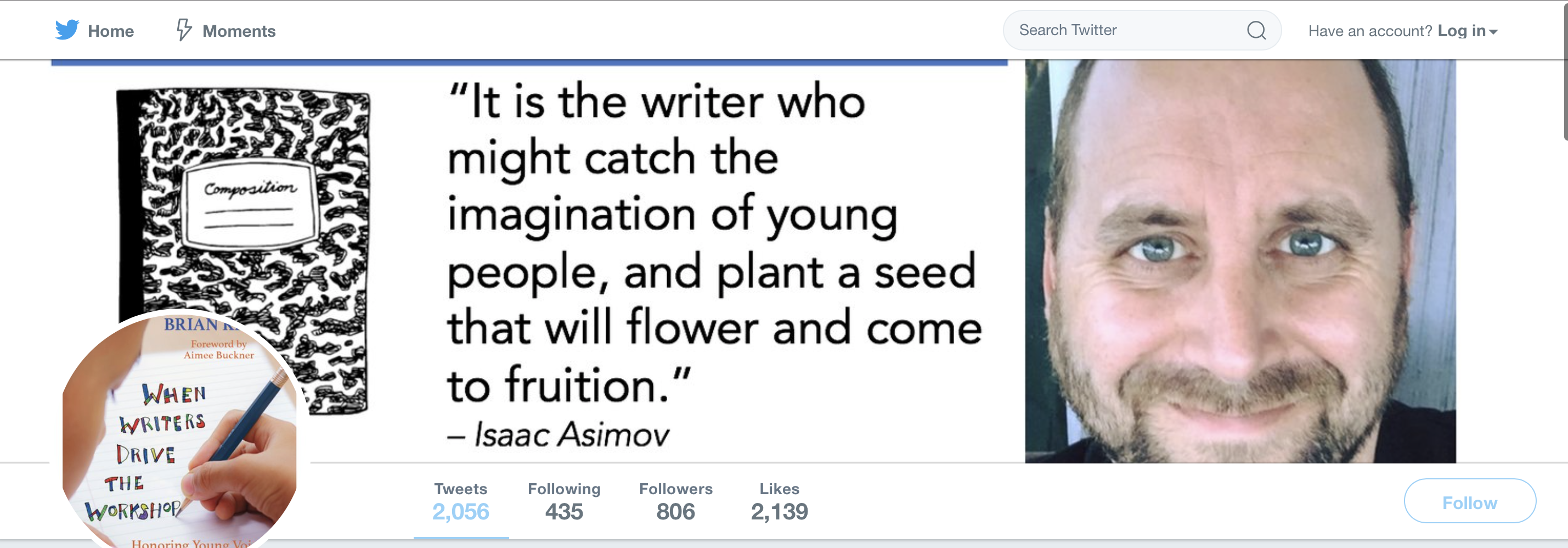
Your words are ‘planting the seeds that will flower’ into amazing young writers who reside in the writer’s workshop our children deserve Brian…
Thank you for reminding us that our writers are the curriculum!
Writer’s Workshop Learning Images Brian shared during #G2Great
More inspirational tweets from our #G2Great friends
Links to learn more about Brian
Brian’s Book(Stenhouse)
https://www.stenhouse.com/content/when-writers-drive-workshop
Link to Brian’s YouTube Channel: https://www.youtube.com/channel/UCxvY2nSFp51ppKfPySfsffQ
1st Grade Author’s Chair with Brian
https://www.youtube.com/watch?v=q0Bwu36vE7w&feature=youtu.be
Brian’s Reading List http://www.briankissel.com/brians-reads.html
Storify https://storify.com/DrMaryHoward/8-10-17-g2great
Brian’s Website: http://www.briankissel.com



















